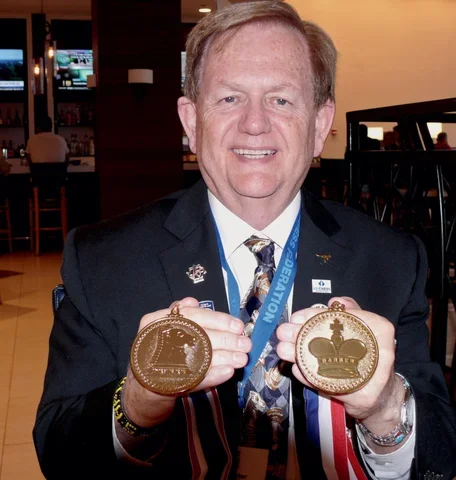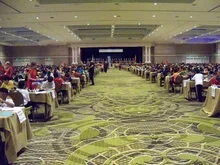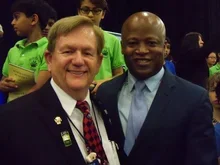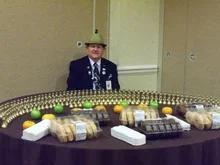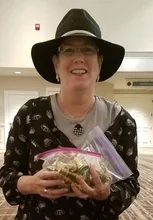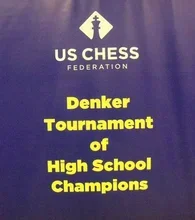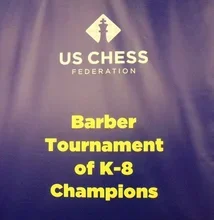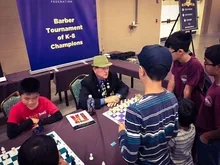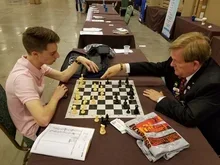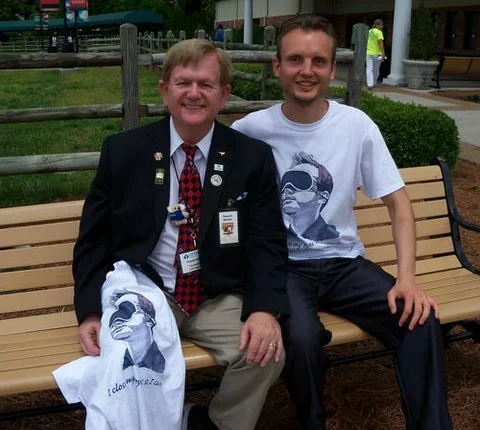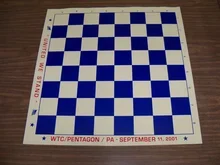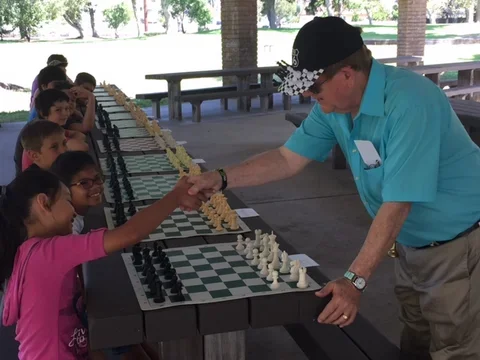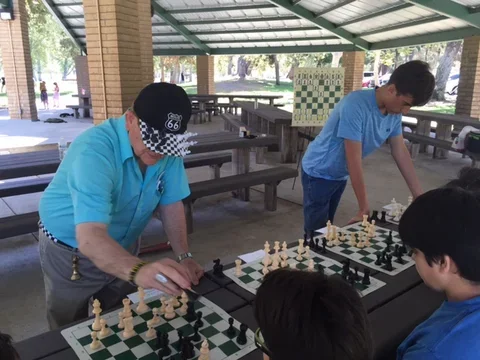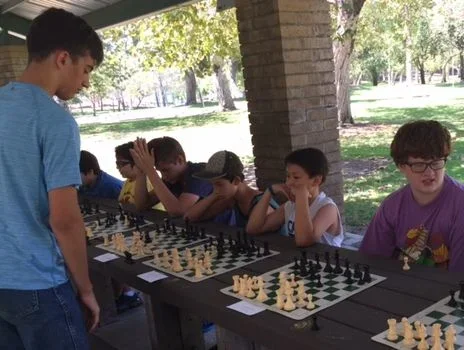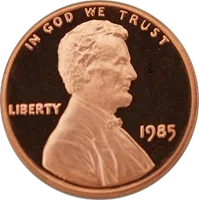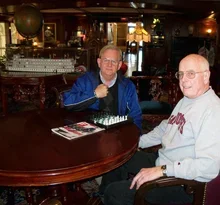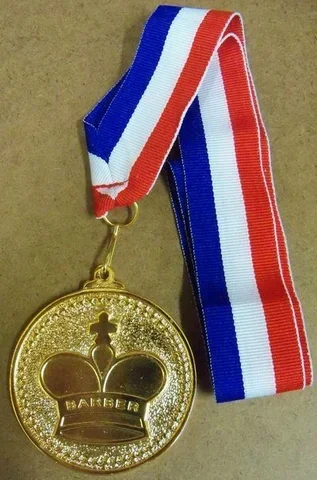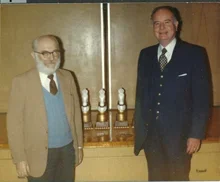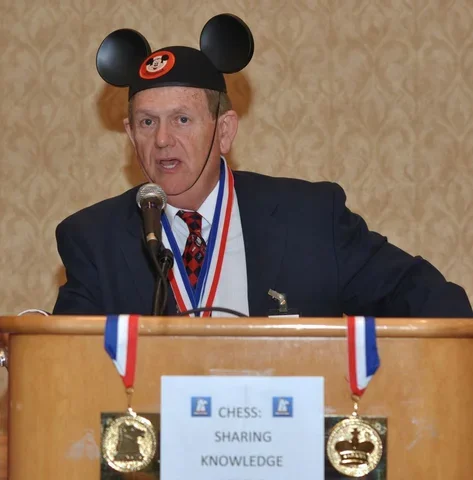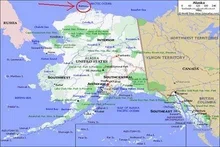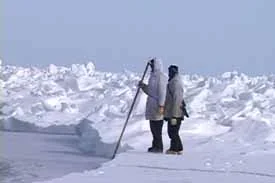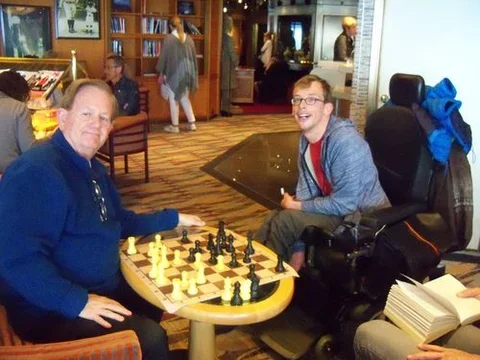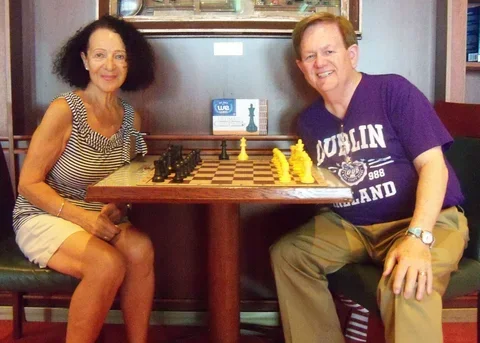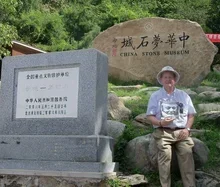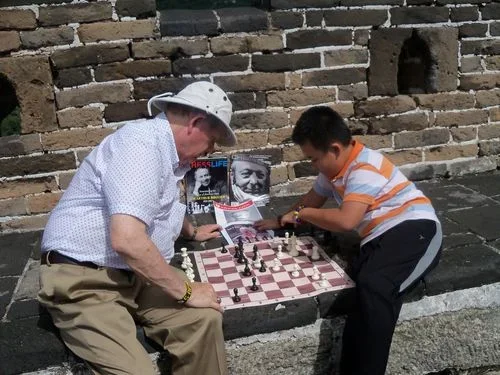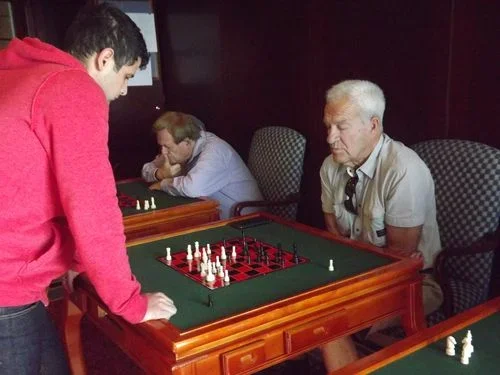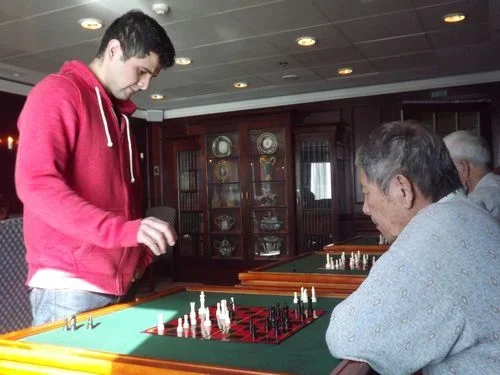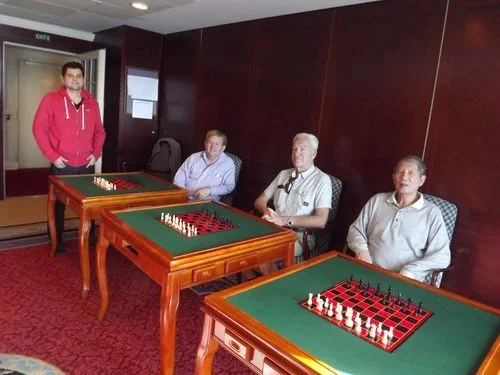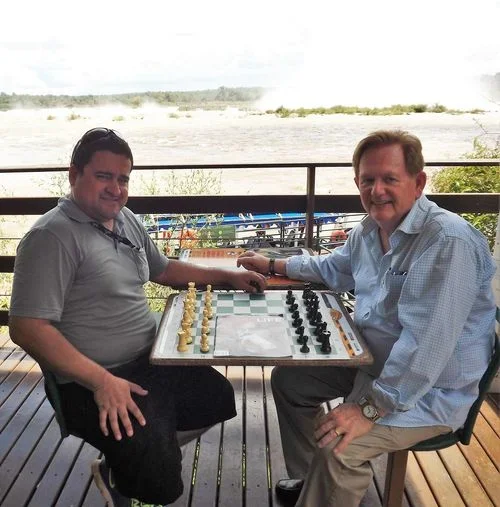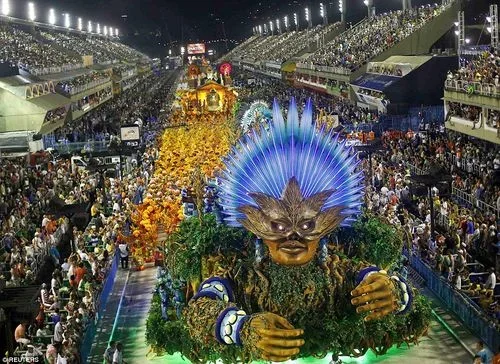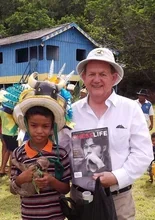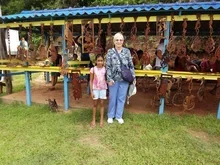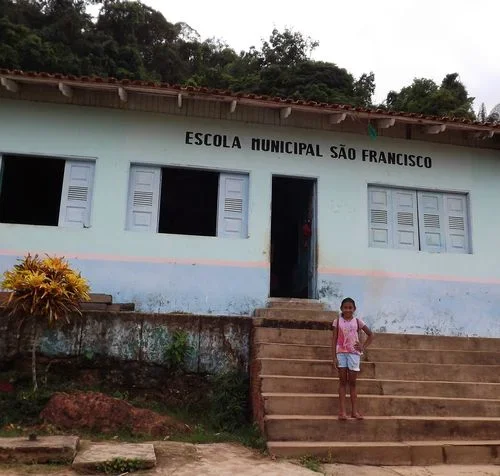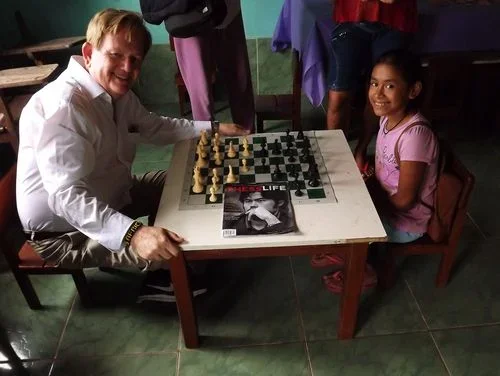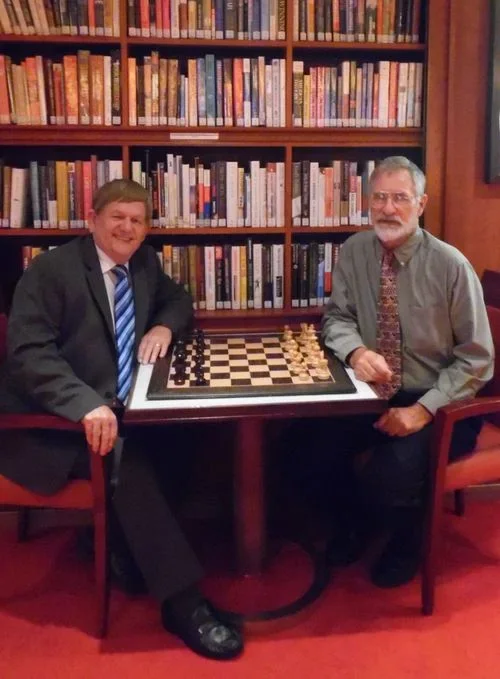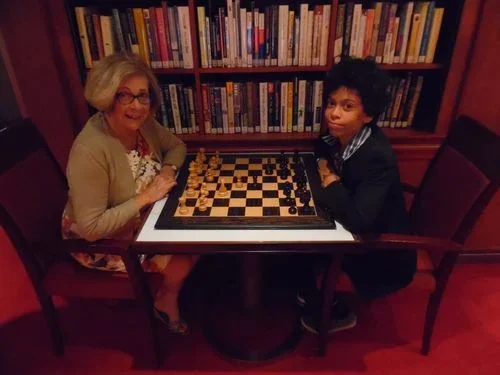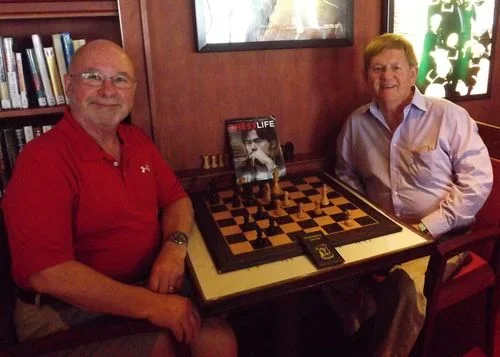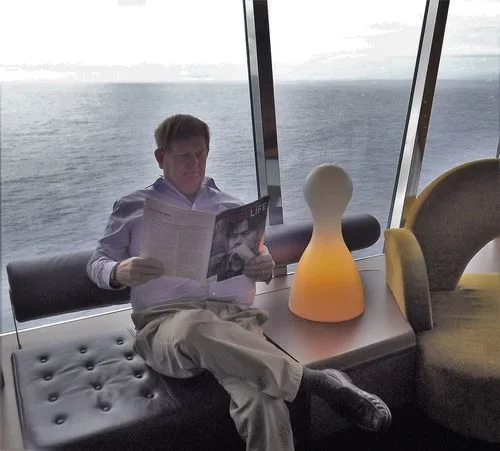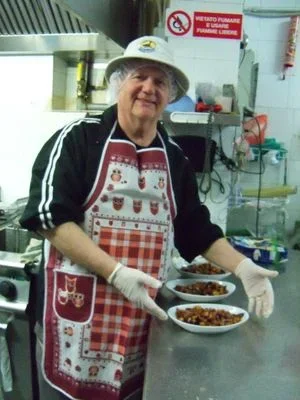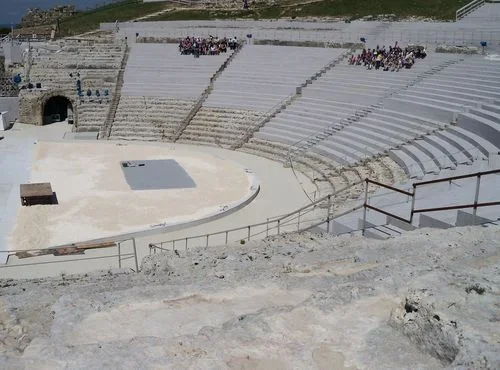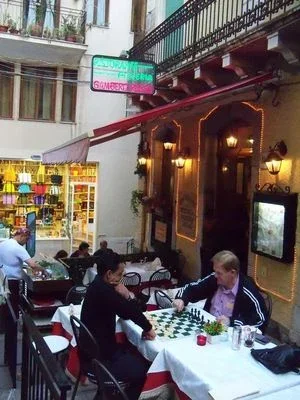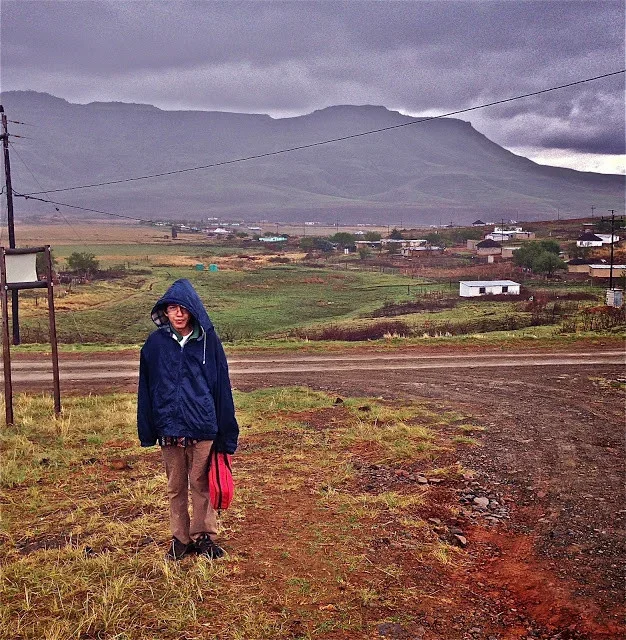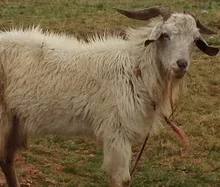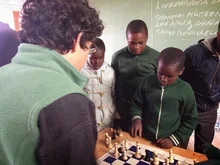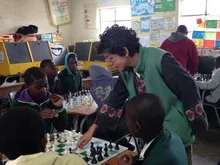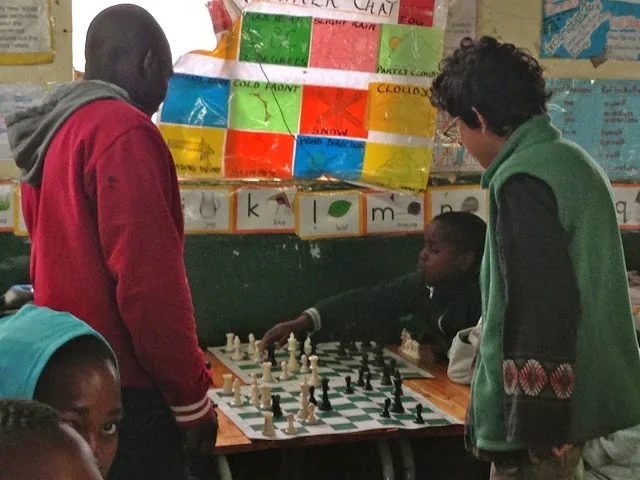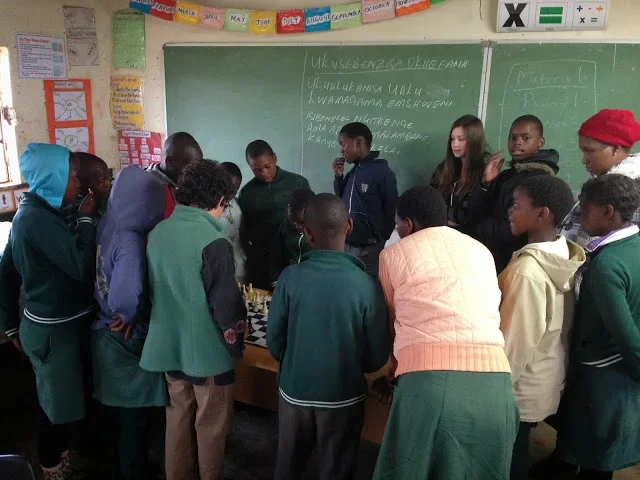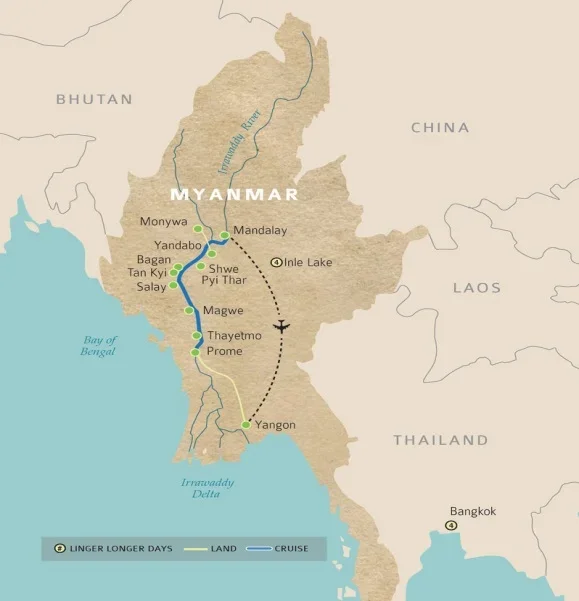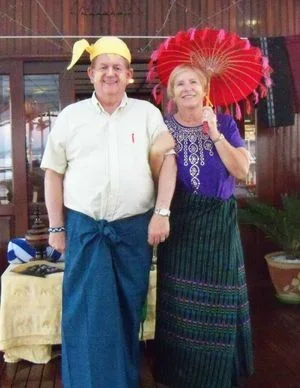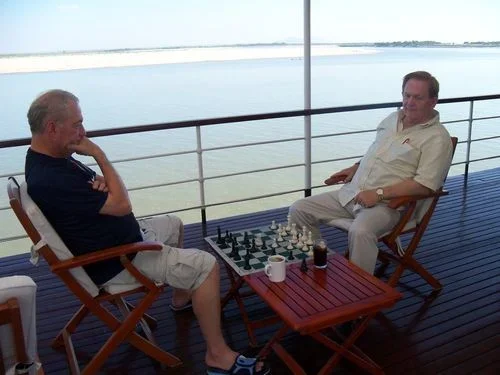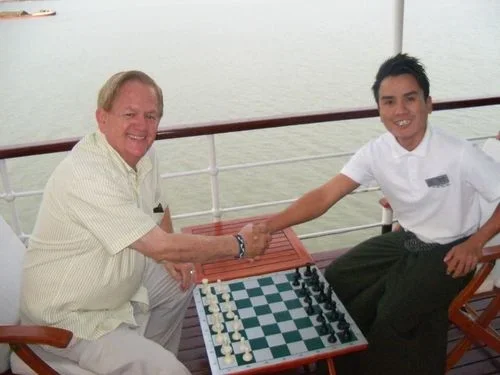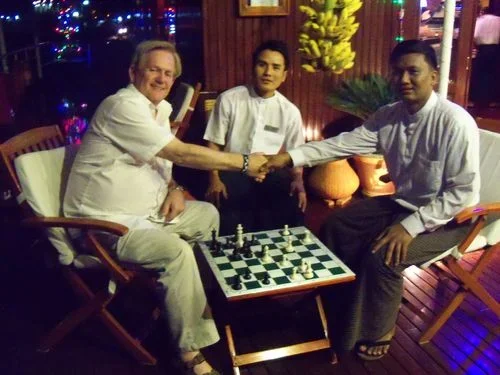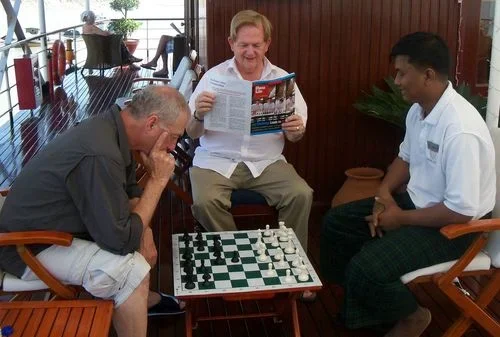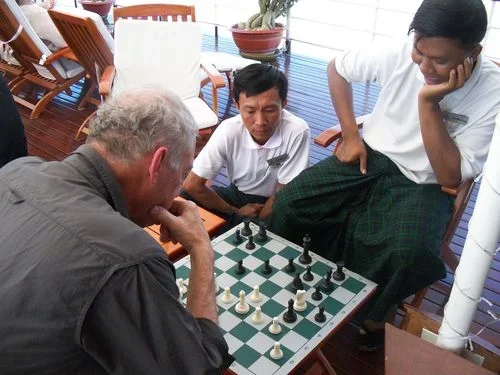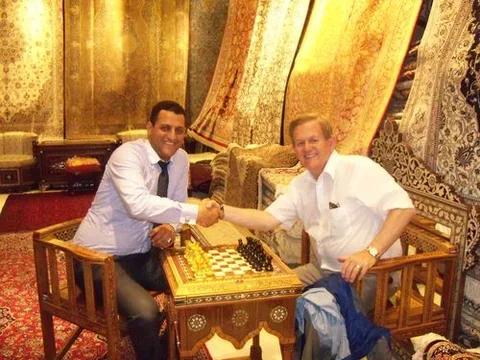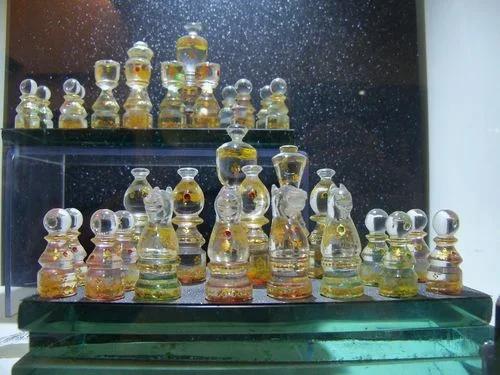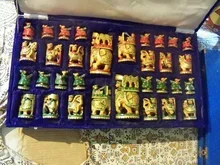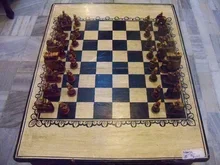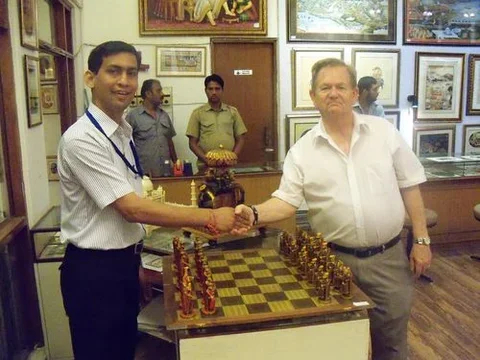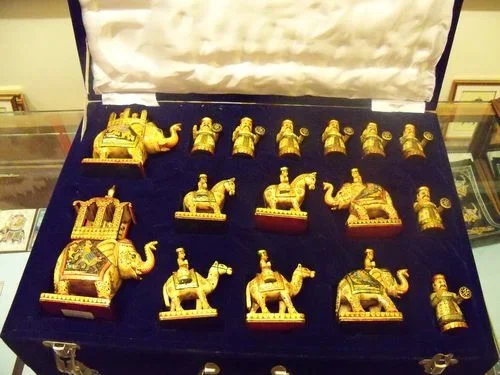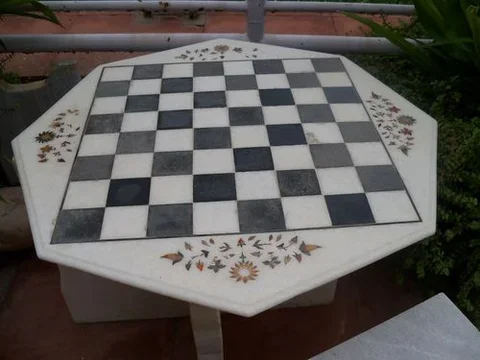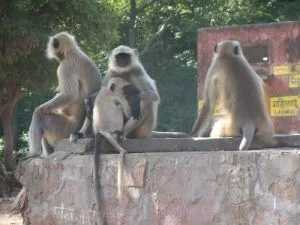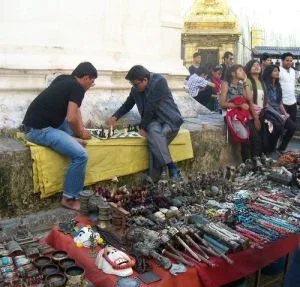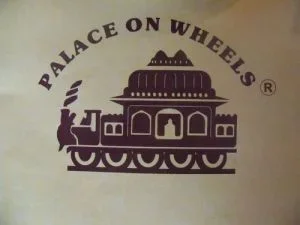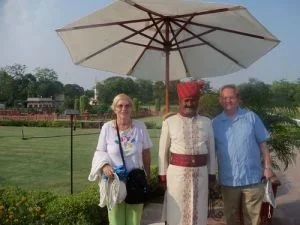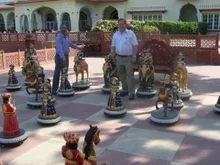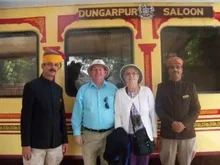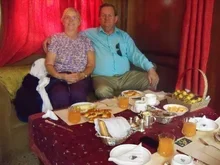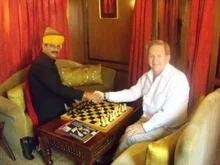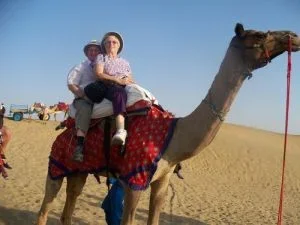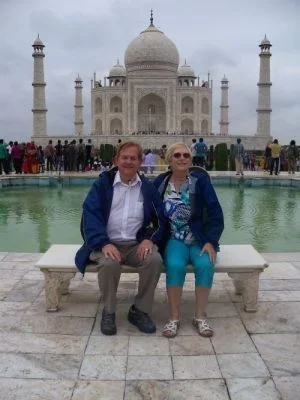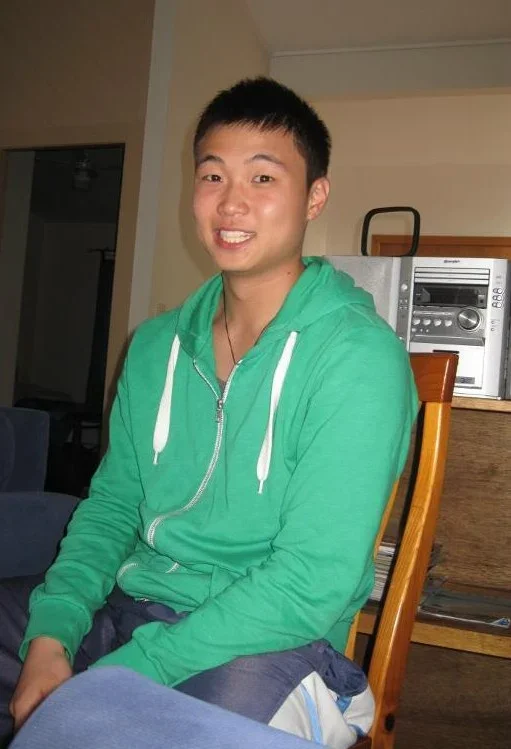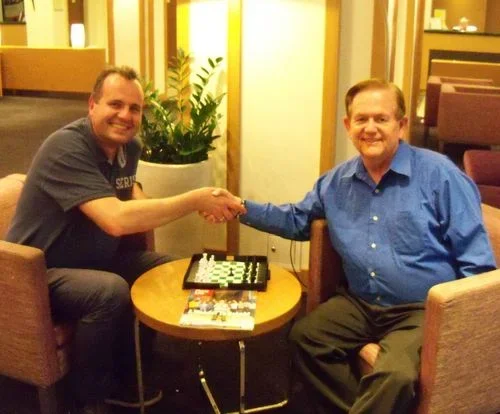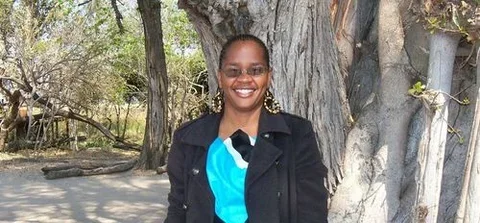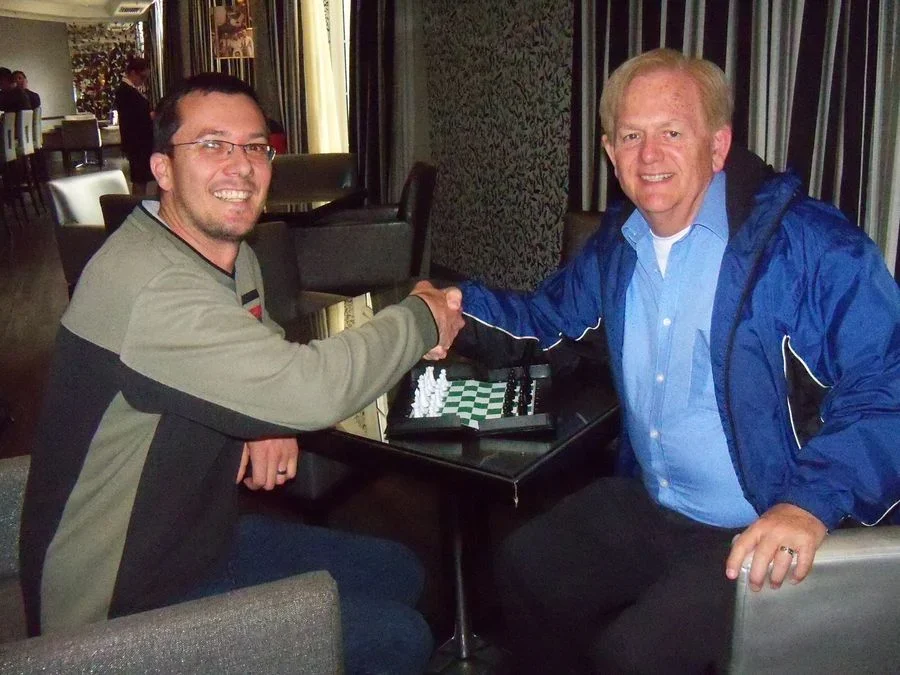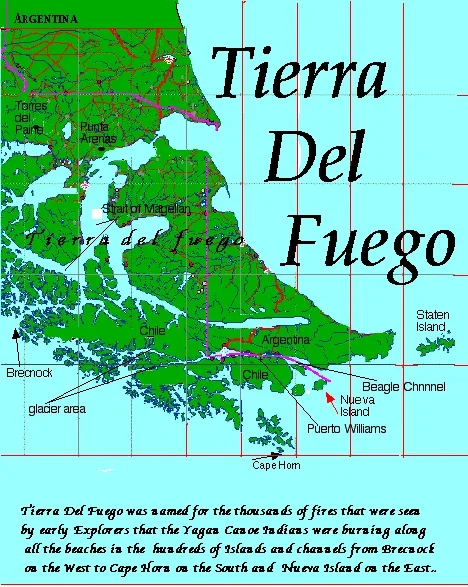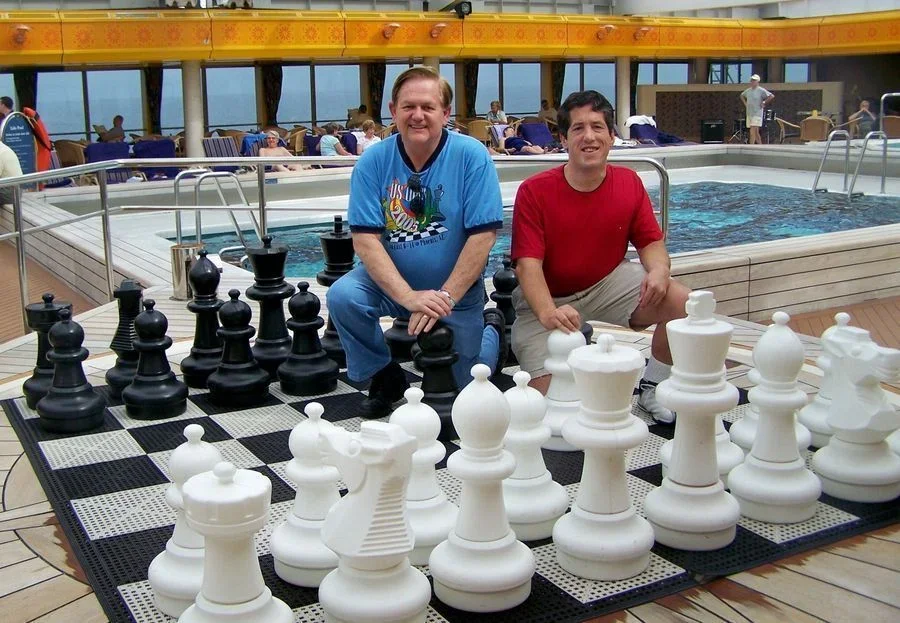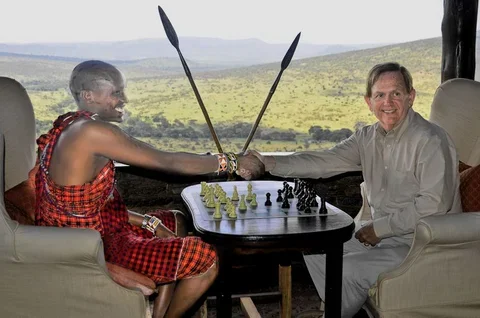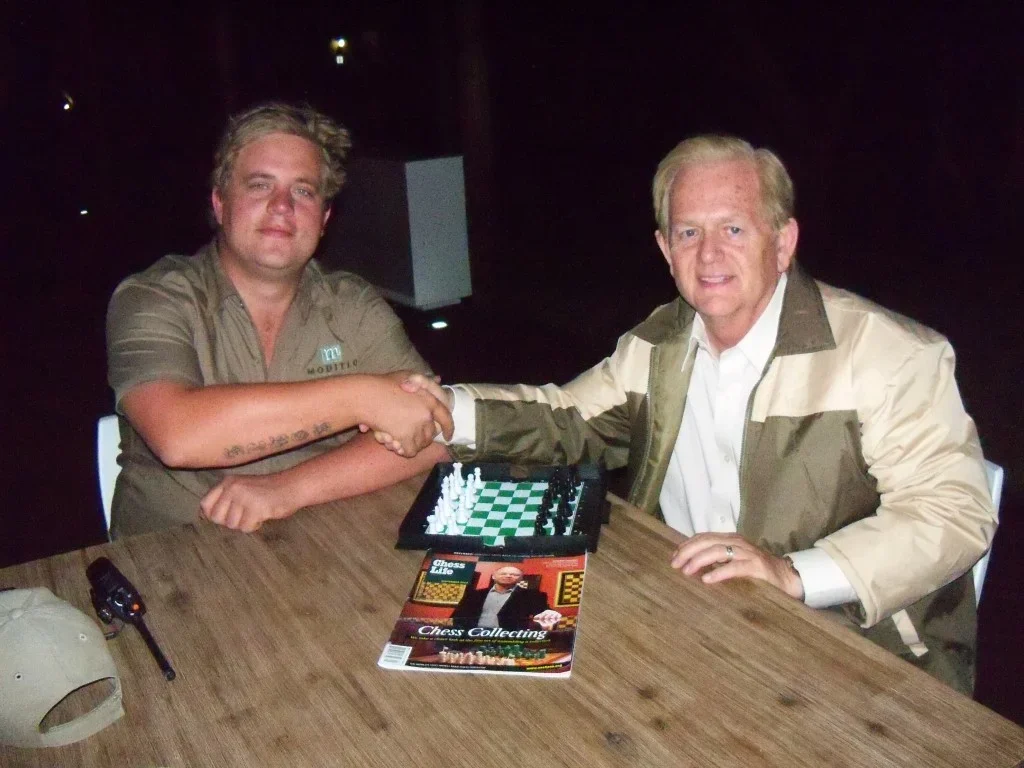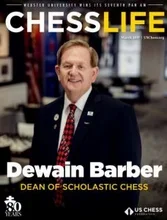
By Ralph Bowman
Mr. Barber learned chess in Norman, Oklahoma from his older brother Dwight, and shortly thereafter joined a school chess club in 7th grade. He played in his first tournament, a scholastic event, in Tulsa that year.
His favorite memory as a chess player happened at the Cerritos Chess Club in Southern California on December 19, 1975. This was a large chess club that often held simultaneous exhibitions (simul) with grandmasters. One of these simuls was with six-time US Champion Grandmaster Walter Browne. The simul started at 9 PM. At 1 AM Dewain looked around the room and notice many empty chairs. He had been concentrating so much on his game that he did not notice there were only seven boards still going. He was up an exchange and a pawn. Taking into consideration how tired he was, Dewain offered a draw and it was accepted. GM Browne’s result for that simul was 57 wins, 2 draws and 3 losses.
He played off and on over his school years. Upon graduation from Northern Arizona University, he started a teaching career in the Buena Park Elementary School District in Buena Park, California where he taught World and American History to 7th and 8th Grade students for 30 years.
During his teaching, the staff at his school was asked to provide a club for the students to volunteer to join. He chose chess and games. Later this was to become the chess club that he continued for 27 years.
Mr. Barber relates these stories about his chess teams:
“As chess coach one of my favorite stories was an encounter with a new student, Andrius Kulikauskas who was later to join my Buena Park Junior High Chess Club. As I had been playing tournament chess for several years, I had reached a level of 1410. During the school day I would play students before school and during lunch. On one particular lunch time Andrius (Andrew) walked in and starting watching my game that I was playing with one of the members of the chess club. While these games were in progress I usually answered questions about homework and graded papers, which was not disrespectful of the chess players whom I played. This multi-tasking kept me busy and able to have fun at chess as well.
When I finished the game I was playing, Andrew asked if he could play me. Usually I have new students play someone in the club first, but I decided to see what this young man knew about chess.
As the game progressed nothing was unusual and I graded papers and talking to students about their work. After several more mechanical moves I noted that I had lost the center and I was a Pawn down. Not to fear I was a “skilled” tournament player and I would pick up the Pawn in the middlegame. Continuing to multi-task I once again looked at the board and noted that I was now a Rook and a Pawn down with a gathering crowd of chess club members. Fortunately, they were not drooling, but seemed very excited. I was excited as well! What is happening here? A student who walked in off the playground had never to this point in my coaching career beaten me. I put aside the papers I was grading and starting really concentrating on the game. In addition, I asked students not to ask questions about their schoolwork till I finished this game. It was not looking good for the old coach. I began concentrating on the game at hand and with good play I won in the endgame. Later on Andrew was to become a US Chess Federation National Chess Master.
The best finish my National team ever achieved was tied for 5th Place at the National Junior High in Terre Haute, IN. Other teams have placed 14th or in the top 25.”
“One particular student who stands out is a young 7th Grade student who told me later in life that he only came to school because chess was available before school and during lunch. I do not know if this was the driving force in his life, but he later graduated from college and went on to teach chess and math. In addition, National Master Joe Hanley decided to open a chess center in Irvine, CA to support all the young people who wanted to learn about the game.”
“Another young 7th Grade student, Ed Motley that should be mentioned was active in Scholastic Chess through High School, received an appointment to West Point. Since I lost track of him I had no idea where he was. As it turned out I was at a National Junior High event nearly 20 years later where I was attending a coaches meeting. When the meeting was completed and I prepared to leave, I heard a voice from behind that said, “How are you doing Mr. Barber? I turned around to see my former student, Ed Motley, in the meeting. I was impressed when he asked me to meet his team that had come to that National event. As I arrived at the team room he introduced me to his players who were having a great time and then he introduced me to his son, a member of the chess team. This happened again in April 2011 at the event in Huntington Beach, CA called the Dewain Barber Scholastic sponsored by NM Joe Hanley.”
In 1974 Mr. Barber attended a meeting in the City of Orange, CA that brought together organized chess from throughout Orange County. Mr. Barber has assisted or organized the Bernard Morrison Scholastic Chess Tournament (Bernard Morrison taught chess to Orange County elementary students since 1974) and Miley Staser Scholastic Chess Tournament (who also taught elementary students since 1977) in Southern California.
As Scholastic Chess growth occurred in this country, Mr. Barber was part of that effort. He created “A Guide to Scholastic Chess” which provides information to school-based persons on how to start a chess club. Over 50,000 copies have been distributed and it is currently available on the “Teachers & Coaches” page of the US Chess website. This book is the basis for the US Chess Certified Local Chess Coach (Level I) test. This publication has been given away free since its inception. It is in its 11th Edition.
He has been a member of the U.S. Chess Federation’s Life Member Assets committee, Scholastic Committee, and former member of the Scholastic Council. During this time he asked the US Chess Delegates to create the Scholastic Service Award to recognize persons for their “Many Contributions to Scholastic Chess”. In addition, he helped create the National Girls Tournament of Champions (NGTOC). He has been chairman of the GM Arnold Denker Tournament of High School Champions. For more information on his involvement with the Denker Tournament see “GM Arnold Denker: The Legacy”.
Because of his life of teaching and coaching K-8 players, Mr. Barber wanted to create a national tournament specifically geared for the winners of State Championships who were in Grades 8 and under. In 2010 the US Chess Board of Delegates approved the “Dewain Barber Tournament of K-8 Champions”. The inaugural tournament was held July 30 to August 2, 2011 in Orlando, FL. The K-8 players played in the same room and at the same time as the players in the “GM Denker Tournament of High School Champions”.
In September 1982 Dewain started his company, American Chess Equipment. He began the company because he had found it difficult for schools to purchase chess equipment at reasonable prices. The company now does business in all 50 states and 10 foreign countries. He has committed his company, American Chess Equipment, to continue to sponsor the Denker and Barber tournaments. The company was recently sold to Shelby Lohrman and has continued to be a chess equipment supplier to the chess community.
When asked, “How has the game of chess influenced your life?” the following was his response:
“As a schoolteacher I was seeking something to enrich the lives of young people. Chess became that vehicle. I have seen the positive effects of Chess on thousands of Scholastic players, met dedicated coaches, organizers and had an opportunity to travel around the world meeting people and playing this game. When I was in China I went to a school and meet some teachers who were directing a school program in Chess. They valued Chess as a learning tool as much as I do. As Chairman of the GM Denker Tournament of High School Champions, it has been my pleasure to meet some of the nicest high school students that this country has to offer. The Denker Tournament has been one of the stepping-stones for numerous Grandmasters and I thank GM Arnold Denker and his son, Mitchell Denker for creating and supporting this event. The people I have met in my life in chess have enriched my life many fold.”
Mr. Barber has been a recipient of the following awards:
1995 Recognition for his 20 years of service to Scholastic Chess by the Southern California Chess Federation Board
2000 Teacher of the Year, Buena Park School District
2000 US Chess Scholastic Service Award
2002 US Chess Special Services Award
2003 Volunteer of the Year Award of Junior Achievement of Southern California
2008 U.S. Chess Trust Harold Dondis Award
2010 US Chess Meritorious Service Award
2014 City of Fullerton, CA 40 Year Achievement Award for Morrison Scholastic Chess Tournament
2016 US Chess Distinguished Service Award for Lifetime of Dedication to Chess
2018 US Chess GM Koltanowski Gold Medal for exceptional support to chess
2018 Honorary title, “Dean of Scholastic Chess”
2019 US Chess GM Koltanowski Silver Medal for exceptional support of chess.
- 2019
Dewain Barber Given New Honorary Title: Dean of Scholastic Chess!
Written by WGM Jennifer Yu Simul
August 3-6, 2019WGM Jennifer Yu, current Champion of the US Chess Women’s Championship, conducted a FREE 23 board Simul to begin the US Open in Orlando, Florida on Saturday, August 3. Participants were players from the Denker, Barber and Haring National Girls Tournament of Champions (Haring NGTOC) with up to seven participants from each of the three events. There was a special guest participant: Minnie Mouse. All the participants and parents had their pictures taken with the lady from the “Mouse House.” There were no wins. Because of the high ratings of the players there were 9 draws. One was to Minnie Mouse who was coached by WGM Jennifer Shahade. Minnie had to leave early because she had a lunch date with Mickey at the Cheese Factory. Congratulations to the following players: Best Game-Hayes Goodman (RI) and Longest Game-Cindy Jie (FL).
Game Analysis and a Meet and Greet
The Texas Tech University (TTU) students, WIM Iryna Andrenko, a graduate in Horticulture Science, GM Andrii Baryshpolets, graduate in Agricultural & Applied Economics Ph.D. and Jennifer Yu were available for game analysis and a Meet and Greet party for players. WGM Jennifer Shahade, 2 time US Women’s Champion and US Chess Women’s Director was also on hand to meet the players and help with game analysis.
2018 Barber Results
Written by Dewain Barber
August 3-6, 2018Congratulations to CM Robert Shlyakhtenko (CA-S), rated 2394 who scored 5/6 for a tie for First Place. He received the $5,000 College/University Scholarship to the school of his choice on tie-break provided by the Barber Fund. The other Co-Champion was FM Jason Wang (OH). There was a seven way tie for 3rd Place involving FM Shunkai Peng (OR), NM Danila Poliannikov (MA), CM Samrug Narayanan (MN), NM Dimitar Mardov (IL), NM Raghav Venkat (FL), NM Gus Huston (NY) and IM Arthur Guo (GA) with a score of 4.5/6. There was a field of one IM, 2 FMs, 2 CMs and 10 NMs.
NM Dimitar Mardov (IL) was the winner of the $500 Barber K-8 Camp Award for best result under the age of 12.
See the full article in US Chess Story
- 2018
Dean of Scholastic Chess
Written by Dewain Barber
September 8, 2018As I sit at home thinking about all of the activities that took place at the 2018 US Open in Middleton, Wisconsin, I “Awonder” if it was skill or luck. Thank you to Awonder Liang for playing in the 2013 Barber Tournament of K-8 Champions as a young person. This year he became a Grandmaster and presented a simultaneous exhibition for participants in the Denker, Barber and National Girls Tournaments. This event was part of the opening activities of the 2018 US Open.
The story really began back in 1984 with a phone call that changed my life. We all will have these moments, but I could not have imagined back then all that would happen. I received a call from GM Arnold Denker, who was later to be named the Dean of American Chess. GM Denker simply said to me, “I want to do something for the kids.” At first, I thought he was going to donate his time to do a simultaneous exhibition or volunteer to pass out trophies at one of the Nationals. But as it turned out, he wanted to do a whole lot more than I expected.
He provided an idea or two suggesting an event that brought together every state high school champion. The question was how to select deserving players who would want to travel to this event. Would it be the highest rated player who qualified? Would it be based on age or something else?As it turned out, we agreed to invite the champion from the high school tournament of each state to play. But, when? Since I was acquainted with the scholastic schedule, I knew that many of the months that might be considered would be out. Fall was the start of the school year, winter would present problems with travel, and spring was devoted to competing in state events and the Scholastic Nationals. The end result was a decision by both of us that summer would work best. But, where? There were few scholastic events available during the summer because most families were on vacation. This would mean starting a new event with no support. Arnold suggested the US Open as a possible site. He had been US Champion and had played in the US Open for many years so it seemed a possibility. The US Open was a very prestigious event with many strong players at all levels and ages wanting to compete so the fundamental question was, “Would the US Chess Federation accept a bunch of high school kids playing at their event?” Maybe yes, maybe no.
Because GM Denker was well known to the adult chess community and the Delegates, he created a motion that I co-sponsored and the delegates agreed by acclimation after he said the words, “This is good for chess.” This action created what is today known as the GM Arnold Denker Tournament of High School Champions.
This event has hosted 1,011 high school players, fourteen of which have gone on to become Grandmasters. One of those GMs was Alex Fishbein who won the first Denker event in 1985. What is unusual is that this year he played in the first National Senior Tournament of Champions in which he tied for first. In addition, Alex’s son, Mitch played in this year’s Denker! The Denker Legacy is alive and well.
Four events have followed this initial Invitational offering: GM Polgar Girls, Dewain Barber Tournament of K-8 Champions, National Girls Tournament of Champions and the National Senior Tournament of Champions. It has been quite a story over these last 34 years. I have been pleased to have been a part of this Legacy with the sponsorship of the US Chess Federation. I would also like to thank the US Chess Trust for their support.The future is very bright for Scholastic Chess. We are all poised, youth and adult, to fulfill the mandate given to us by the Delegates of US Chess when they revised the mission of our Federation to focus on education of both youth and adults. To carry out the change in the mission mandated by the delegates, in the words of our Executive Board president, Allen Priest, “We have a legal and moral responsibility to change.” This movement of change to an educational organization for all ages started in 2008 with the delegates’ mission restatement. It continued with the filing of revised Articles of Incorporation in 2009. And the IRS recognized the change by granted US Chess 501(c)3 status in 2014, retroactive to 2009.
To further support this change, all we have to do is look at what Allen saw when he visited the US Chess Championship in St. Louis. He stated, “This is a very American Event with merit and opportunity for American participants who represent a diversity from around the world. We are an American institution. Just visit one of our National events and you can see who we really are.”
I have no problem embracing this future. As a retired school teacher with 30 years of experience, I had the pleasure of hosting a chess club at my school. During one of those years we had been planning to attend the US Chess National Junior High Championship when I received a note from the office to see the principal. I stopped by his office and was informed the trip was off. I was shocked to learn the reason why: The US Supreme Court had ruled that all public schools could not have events that were not “curriculum-based”. I then went into the Curriculum of the California Common Core State Standards and located 14 statements that supported what chess teaches. I presented the information to the school board of my district and our chess club was designated a “curriculum-based” chess club, the first in California to be given that designation. We were then able to take our trip. Chess can be an important educational component if the chess advisor chooses that direction.
In their Mission Statement one of the core values of US Chess is “Education. Chess is an educational tool aiding in the learning of planning, cause and effect relationships, pattern recognition, and research, all key skills for success in STEM (Science, Technology, Engineering, Mathematics).”
Another area of concern is the development of a strong Scholarship Program for Youth. President Priest said, “We now have in place a program that can support scholarships that are earned by scholastic players.” I look forward to working to assist with this goal. I hope that many colleges/universities continue to support scholarships for our chess youth. In addition, we need to seek out donors who clearly see that by donating to the US Chess Scholarship Program, we will be using these funds to support this goal. These funds will be separated and maintained for the future.
I would like to thank the Executive Board and Delegates of the US Chess Federation for honoring me with the title: “Dean of Scholastic Chess”. I will continue to work with everyone to promote scholastic chess.
Florida, SoCal and New York Tie for First in Team Competition
Congratulations to Florida on their First Place tie-break finish (13/18) with a team average of 2138. Southern California matched their point total (13/18), but lost on the second tie-break with a team average of 2243. New York was also in the hunt with a point total (13/18) and a team average 2268. The Florida state team was composed of their Denker representative, Ryan Hamley (4/6), Barber representative, NM Raghav Venkat (4.5/6), and Haring NGTOC representative, Tianhui (Cindy) Jie (4.5/6). The Southern California state team was composed of their Denker representative, CM Brandon Xia (4/6), Barber representative, CM Robert Shlyakhtenko (5/6) and their Haring NGTOC representative, Julia Sevilla (4/6). The New York state team was composed of their Denker representative, NM Max Jiahua Li (3/6), Barber representative, NM Gus Huston (4.5/6) and their Haring NGTOC representative, WFM Martha Samadashvili (5.5/6).
State Team winners in the Under Sections: (Under 2100) Texas. In the (Under 1900) it was Utah and in the (Under 1600) section was New Hampshire.
- 2017
Interview with Dewain Barber
By Pete Tamburro
July 31, 2017It was my good fortune to be able to sit down with Dewain Barber after the Denker/Barber/National Girls Invitational tournaments and talk with the motivating force behind the hugely successful youth tournaments, one of whom bears his name. If you want to know why this man has been so determined, read his story about Sergei Sazonov below. I cannot recall meeting someone so skilled at weaving a story, so the answers I recorded on the printed page below cannot do him justice. I can accurately tell you this. He does chess out of love. He does it for free.
PT: So, tell me about a junior high teacher who up and decided to change youth chess in America.
DB: Way back in the last century my principal said he wanted all the teachers to have an activity on Friday afternoon. I finally settled on a games club…checkers, chess, monopoly…sharing an opportunity to play different games…It became the chess club…I ended up providing time during lunch hour and the break in the morning. This was around 1972-73– Bobby Fischer time. The kids wanted to take it to the next level. I didn’t know what the next level was. In 1974, I went to a meeting at the Orange firehouse (a retired building) and met a few scholastic chess organizers. I became the rookie in the newly organized Orange County Chess Association. We hosted a free scholastic chess tournament K-12, playing only kids in your own grade. The kids enjoyed themselves. There were no championship trophies 3 ft. high.
PT: What else can you tell us about that time?
DB: We needed chess sets. Leo Cotter at Mission Viejo High School said there was a guy in Massachusetts, who sold them. So, we called Steven Dann. “Can you provide me 20 sets.” “They only come in boxes of 40. You must buy 40.” Twice the number we needed. They were a dollar a set with free shipping. “Man, that’s a lot of money. I have to check with my wife!” (in charge of finances) We would charge a dollar a set. As for the boards, that became an adventure. Leo told me, “We have thin vinyl stuff for 20 x 20 chessboards. We can make chess boards by silk screen.” My wife asked, “You have a roll 48” wide 20-30 ft. long. How will you do that?” “I’ll get my straight edge.” So here I am with my box knife…On my hands and knees I made up 50 pieces of material…got the silk screen…went to the high school…I’d never used it before nor had Leo.…We put ink on, etc., white and dark squares were solid green! We failed to ask how to do silk screening! We improved to blotches, then finally got it right.
Now our problem became 150 orders. Dollar a board, dollar a set. We had only 40 sets. Dann sent some more. We started to sell chess equipment to schools. Then people asked, “What’s a good book?” “What’s a good clock.” I didn’t know what a chess clock was in 1978. We found Jerger clocks in Germany. Our production of sets increased. My wife said we had to start a company. So, in 1982 we started American Chess Equipment.
PT: Do you still do that as well?
DB: We sold the business to Shelby Lohrman. We had $530,000 in sales that last year and never got out of our 3 car garage.
PT: How were you enjoying chess back then?
DB: I took teams to the national championship. I taught at Buena Park Jr. High School. That original tournament we started 43 years ago is still running. I make sure to return every year to direct it. There was this episode with the Supreme Court case. I was about to take our team to the national junior high championship. The principal said I couldn’t take the team as it was not authorized by the school board. We were not an official group according to a court case, and we were not curriculum based. I went through the California state curriculum for mathematics and cited line by line the deductive reasoning section. We were allowed to go…the first chess club in California to do so.
PT: Were there others that helped out in a big way?
DB: Yes, we named that tournament the Morrison Scholastic after Bernard Morrison, who was originally from New York. He was 80 years old when I met him. He would always call me up and tell me, “You’ve got to get excited.” I would drive him to and from after school programs where he taught chess as a volunteer. I always thought that if I could do 20% of what Bernie did for chess I would consider myself successful. About 50 years later, I think I’ve caught up with him.
PT: How did things go from there?
DB: In 1985, I, living in Anaheim, got a phone call from a lady in Florida. “I want to start a chess program at my school. I’m a teacher. Tell me What do I have to do?” I replied that there were about 500-600 hours of instruction involved down the road, but her first step should be to put a note in the school bulletin to come to Room 20. She called back. “Another question. What do I do with the 80 kids?” That’s when I sat down and wrote A Guide to Scholastic Chess. It’s been revised 11 times. Tim Just is the most recent editor. It’s always been free of charge and can be found online. It’s been sent to 40,000 school teachers, administrators or districts. From the simplest initial questions: “What do I do first?” “Do I need to know chess?” It was in such a language that a non-chess player could open the door. That was the key answer: just open the door. The kids will do the rest.
PT: How did you get involved with Arnold Denker?
DB: (he pauses) I get emotional when I talk about it. A friend of mine never leaves the stage at the opening ceremonies. If I get choked up, he’ll take the spot.
Arnold called me on the phone. I didn’t know him. I wasn’t the USCF president. I was just a guy. He was direct: “I want to do something for chess.” I figured he meant a simul or a talk. He wanted to create a brand new event. Questions came up. What time of year is best? The schedule is crowded. We could do a tournament, bringing together all the state champions. Where? Arnold suggested the US Open. In my mind, a bunch of old guys would not be tolerating a bunch of kids at the tournament. Arnold replied, “I’ll take care of them. You take care of the scholastic committee.” In 1984, at the US Open, I met with the scholastic people who wanted to give it a try. The motion appeared on the floor of delegates. I got up and explained that we’ll have a championship of champions. Dead silence. You have to understand that back then that most of the delegates had no connection to scholastic chess. It was adult this adult that. Arnold got up. “This is good for chess.” Then he turned around and walked away from the mike…no rah-rah speech. The question was called and every single hand had been raised…unanimous approval. I was thunderstruck. Then Arnold told me to write the rules. One child from every single state plus parents. I wrote 13 rules. 27 Kids from 26 states came. I required that the host state provide an alternate to play any state champion who would have gotten a bye. No champion should get a bye. We needed to go from the original five rounds to six on a 1-2-2-1 schedule over four days so the kids could play in the US Open. Arnold donated $100 to every participant who completed the tournament. The Chess Trust stepped up to donate a $500 prize fund.
PT: Did it catch on right away.
DB: One player didn’t come because the participants weren’t high enough rated, but we still went from 33 to 38 states, then 40 and 46, and finally all 50 states.
PT: So, it has been a huge success.
DB: Question trivia how many persons have played Denker since 1985 to 2016 –1038!! Plus 48 this year. Follow up question. How many became GMs–10. The first Denker winner was future grandmaster Alex Fishbein.
PT: Where did UTD come in?
DB: The University of Texas Dallas contacted us. Actually, Tim Redmond contacted us. “We like what you’re doing in the Denker. We’ll offer a 4 year all expenses paid scholarship to the Denker champion.” That’s about $140,000 in today’s money. We had a 4 way tie one year! I held my breath. No way we would get that. They contacted us: “Gentlemen ALL of you have scholarships to UTD.” The Denker matured with the quality of players. IMs are entered now. 16 or 17 masters now, 24 last year. 3 IMs.
PT: That takes care of the high school tournament. How did the rest come about?
DB: As the tournament prestige built up, we started getting calls from parents of 7th and 8th graders. “My son is the best. I want my kid to play in the Denker.” No, just high school. So, Arnold and I talked it over….why don’t we have a grades 6-8 tournament (Jr. high tournament) plus K-6. All different schools had different definitions of grades. I decided to go to the delegates for a K-8 tournament. 7 years ago. I went before the delegates with a K-8 tournament. Arnold got up once more, and once more his speech was “This is good for chess.” In the back of the room there was a motion to amend. I didn’t like the sound of that. From Minnesota David Kuhns go up and said, “I want to name it the “Dewain Barber K-8 Championship.” I was overwhelmed.
Image Denker & Barber-The Golden Medallions
Denker & Barber-The Golden MedallionsPT: What else pops into your mind from those years?
DB: In 2009 I got the list of participants who would be coming. All of a sudden, I noticed the name Abby Marshall. There were a few girls before 2009 for Denker. Abby was special at Orlando in 2009. We noticed the girl moving up the tables to board one in round six. For several rounds, she was a King’s Gambit player!! Had the boys bamboozled. They didn’t know how to handle it. She won the 2009 tournament. Abby graduated from an Ivy League school… The Denker medallions…one day I was watching the Olympics and their big thick and heavy medallions. Every one of these chess kids is a champion so why can’t our Denker and Barber champions get something so unique, solid metal with brilliant gold finish. The provider made sure it was at least 2.5 inches across with the knight taken from the “Ultimate Chess Set” which I designed. The Denker got the knight…Another time I noticed that Olympic soccer players trade their t-shirts with the other team. Wouldn’t it be nice if each kid came to play bringing six souvenirs from their city or state to give one to each opponent. What a beautiful experience to take home. We’ve done that six years now…Once 3 kids from Hawaii showed up holding their hands behind their back and said, “We’re from Hawaii. Mr. Guy Ontai (organizer of scholastic chess), wants you to have this pineapple. This year Mr. Ontai had his kids present me with chocolate covered macadamia nuts in a beautiful box. He’s fond of saying, “Never worry. Hawaii will be there.”
PT: So, it’s more than just a tournament?
DB: Oh, yes. One year a mother called to say that they couldn’t afford airline tickets to fly the family from Mississippi to Vancouver, Washington. I encouraged them to find a way. A few weeks later, the mom called to say they were driving all the way from Mississippi. I still wear the “Mississippi” pin he gave me. Another year a young man named Matthew Parshall from Alaska called and said that they didn’t have a state championship. Are you the highest rated? Nope. After everyone was on board with Matthew representing Alaska, he showed up. I still remember him holding the state flag like a cape. It’s never been about ratings. It’s about a young person who steps forward. Awonder Liang sent me a lovely thank you note. Never got one before that.
PT: What do these tournaments teach?
DB: They’re about building character, bringing the beauty of chess forward. I usually tell this story. Imagine the following scenario: old gentlemen in a rocker. Who comes in his room but his grandson. “I learned this new game pieces move around I know you’ll like it.” “That sounds exciting.” Grandfather goes into chest of drawers…”Let me show you something, grandson.” I know it will happen. Same with grandmother. Let me tell you about chess. It’s not about a bunch of kids moving pieces.
PT: The girls finally get a tournament of their own. How did that come about?
DB: In 2002, we were in a restaurant for breakfast in Nashville, and who walks in but GM Susan Polgar with her husband, Paul. They saw us and came over: “Tell me about the Denker. Can we do this for girls?” I became a co-author again! In support, I stood up at the delegates meeting and said, “We need to do this to promote girls’ chess.” Now, we had the Denker, Polgar and Barber. I was chair of the Polgar Committee for six years. In no time, she went to 40+ states. Then, the unpleasantness with the dispute between the USCF and Polgar emerged. Susan came to Anaheim where we had a heart to heart talk about how I couldn’t continue on her committee. She understood.
PT: What happened then?
DB: We had a big void financially. Texas Tech had withdrawn its financial support as well. A new woman, Isabel Minoofar from Beverly Hills stepped up and said we needed to have a girls’ events. We didn’t want to be in competition with Polgar, so, at Maureen Grimaud’s, suggestion, changed the National Girls’ Invitational Tournament to the National Girls Tournament of Champions (NGTOC). At the delegates meeting, Arnold showed up, “It’s good for chess.” I don’t think you’ll have a problem guessing a vote. I realized I had co-authored four national invitational championships. It took an hour to do it. I just kept cloning our original Denker rules. Jennifer Shahade had friends in Pennsylvania, Robert and Barbara Schiffrin. She asked them if they would agree to a $5,000 college scholarship to a college of their choice, and they consented. UTD had also withdrawn their scholarships, since, in 14 years, only four students had opted for that school. I personally provided $5,000 and asked the Chess Trust for matching funds. I am also donating $21,000 each year for four years to establish a trust for the future of the Barber Tournament.
PT: How did you get to be so determined?
DB: I was never a good student—pretty much average. I went through school knowing I had to read everything three times to understand it. I had to have that determination. I couldn’t quit. I went to nine summer schools from sophomore year in high school through graduate school. One year, in grad school, I had heard about Dr. Downum’s historical research course. There were only six of us there. An old man, 80 years of age, in a trench coat down to his ankles put an old, weathered, valise on his desk and reached down to pull out 3×5 cards. He laid them across the table and said, “Come up and pick a card.” “Your assignment is to list every book this person is in. See you in 18 weeks.” I looked at my card: Sergei Sazonov. So, I figured let’s get this out of the way and went to the library. I told the librarian I was looking for him. “You’re in Downum’s class, aren’t you?” No Sazonov, no Encyclopedia Britannica article, no card catalogue entry, no internet. I went back to the librarian. “It looks distinctly Russian. Check out the Russian books on the 2nd floor.” I found 400 books and had to check each index. I found him in one book, then six books more out of 430, but not much else. Then, I found a footnote in one of the books. He had written “My Life Story” for NYU Press in 1927. There were only two copies in existence in the US: NYU and Berkeley. I was in northern Arizona! We couldn’t get an inter-library loan. The book was too rare. I went to Berkeley. I didn’t have their student ID card, so they wouldn’t let me look at the book. I begged the librarian, “I have been through more pain than you can believe. I will sit ten feet away and you can watch me treat it carefully with white gloves.” She relented. I found 11 references. I said thank you and went back to Arizona and felt blessed with a B-. What is the significance of this story? I refused to quit. This is the same belief that drives me here in chess. Sazonov taught me never to quit. Years later, my wife and I, who do a lot of travelling, got off a cruise ship in Nice, France and went to find the cemetery where Sazonov was buried. We went to the main office and indicated the plot we wished to see. I wanted to pay homage to the man who had given me the determination to never quit. As we stood in the office, the man said, “The Russian Orthodox cemetery is not open today!” We had come thousands of miles for this, so we walked over to the cemetery and stood at the iron gate and peered through. I knew where it was– just on left hand side 3 up 4 to the left. I couldn’t see the inscription, but knew it was there.
PT: So that’s what drove you all these years?
DB: When I look back on my chess experience and career, I am driven by a legacy called Denker, and driven by a man called Sazonov. I can’t stop I’ve got to go on. Someone asked me if I get sick will I come to the tournament. I will be the only person on a gurney pushed in to the opening ceremony. It’s all about the legacy. Maureen Grimaud, and Jon Haskel know this about me. Other people, as I’ve mentioned, step up as well. Just to mention one more: Sunil Weermantry and Pete Nixon, who had teams to coach, came to the rescue at the 1987 national junior high tournament in Buena Park when the computer crashed and hand-paired the whole tournament! Eight rounds. 400 player tournament. How many people can pair by hand?
PT: You must like the recognition you get.
DB: Last year, I received the US Chess Lifetime Achievement award. I was surprised…it’s a lifetime and I’m still going. You know I don’t accept money…I know there are people who make a living and I’m good with that. I’ve been blessed not to have to worry about that. I always want to pay it forward. Coming back from Sidney, Australia to L.A., I played chess with two Romanian guys and told them to keep the magnetic sets we had (and I had designed)—for a price. The price was when they went home to Romania, they had to find 100 children and teach them how to play chess.
PT: Is there anything we’ve missed?
DB: I wrote the chess part of the script for Mighty Pawns, the movie. Wonderworks program created stories. I got a call: “We’re doing a story about three kids who get in trouble and end up in detention where the teacher says if you want to get out of here you have to learn chess. Can I send you the script?” The original writer had no clue about chess, so rewrite was necessary. We used Buena Park Performing Arts Center and the kids as extras and pulled it off. I created a tournament scene and prepped the extras how to behave as chess players. It was shown as a TV afternoon movie.
PT: What advice do you have for everyone in chess?
DB: Chess players can become very isolated. Meet and engage people about chess. If players are insular and don’t share, chess doesn’t advance. Volunteer teaching chess. Provide a tournament. Go to community centers. Each chess player is responsible to promote chess in their own way. Pay it forward, no matter your rating or skill level.
PT: And remember Sazonov research!
2017 Super Nationals - The Big Show
Written by Dewain Barber
June 14, 2017As I boarded the plane to fly to Nashville, TN, I knew I would be attending the largest rated chess event in the world. The statistics were out and this SuperNationals would be bigger than any of the previous five I had attended. The number was really big—5577 participants!
Every four years since 1997 the SuperNationals had been held with the attendance increasing each time. Below you will find some pictures that were taken at the tournament.
Image 2017 SuperNationals VIImage
2017 SuperNationals VIImage GM Maurice Ashley
GM Maurice AshleySince this event is held on Mother’s Day weekend I decided to provide some recognition for the Chess Moms who were at the event. We passed out Golden Keychain Queens to 160 of our Chess Moms and I wished I had more Queens to give to our Moms. Thanks to Karis Bellisario, a Chess Mom from Arkansas for helping out.
Image Golden Keychain QueensImage
Golden Keychain QueensImage Karis and the Golden Keychains
Karis and the Golden KeychainsOne of the photos taken at the tournament says, “We are all in for our chess kids.” As you can see below, exhaustion over took many a parent. Note the Golden Keychain Queen beside the sleeping mom.
Image Image CaptionMom is all in for Chess!?
Image CaptionMom is all in for Chess!?I want to take this opportunity to thank US Chess for providing the GM Denker and Barber banners. I had the chance to talk to many young people about playing in the Denker and the Barber as well as the National Girls Invitational.
Image Image
Image
I spent a lot of time in the skittles room at the booth that was assigned to me. I had additional Golden Keychain chess pieces and spent time playing some of the young chess stars who were in the room. My rules were simple: 1) If you win the blitz game, you receive a Golden Keychain piece. 2) If you draw the blitz game, you receive a Golden Keychain chess piece. And 3) If you lose the blitz game, you receive a Golden Keychain chess piece. In addition, I met Steven who was the 2016 Denker representative from Arkansas. We took some time and looked at the game that he had just completed.
Image Blitz at SuperNationals VIImage
Blitz at SuperNationals VIImage Analysis of Steven's game
Analysis of Steven's gameFinally, I am happy to say I had a chance to see GM Timur Gareyev, the World Record holder in Blindfold Chess. I appreciate the t-shirt he gave.
Image GM Timur Garayev, the Blindfold King
GM Timur Garayev, the Blindfold King- 2016
9-11 Chess Board
By Dewain Barber
Revised September 11, 2016Image
It was a clear day in LA and the weather was comfortable. My wife, Susan had left to teach school that morning as she had since the start of the school year a few days before.
As I got up to check for orders and begin the packing process of chess equipment for some reason still unknown to me I turned on the TV and there before me was one of the worst days in our nation’s history unfolding with terrible consequences. That day 15 years ago is now known simply as 9/11 and it was upon us with tremendous ferocity.
As memorials and funerals took place for the many people who died in that disaster, I decided to do something that chess players would recognize as a remembrance of that day. I created the commemorative 9/11 chess board. I printed 1,000 copies of this board and contacted many vendors and distributors of chess equipment. I made a simple statement to them, “Please take these boards at no charge to you and sell them at your chess tournaments. With all of the money you receive, whether donations or the price you charge, send that money to the local fire departments in your communities. Tell these first responders that these donations should be forwarded to the families of those killed in this terrible event.”
On this 15th anniversary every player who purchased or gave a donation for this board should take it out and play a game in memory of those who died.
I would like to make note of information that came to me shortly after I gave away these boards: That morning several of our chess instructors in the area of the World Trade Center, the Pentagon and the Pennsylvania sites were providing chess lessons for some school students. It was later learned that some of the parents of these students perished in this tragedy. As with other traumatic events in our nation’s history, we should always remember, “United We Stand and Never Forget.” A copy of this board is currently in the Chess Hall of Fame Museum in St. Louis, Missouri.
Parking It In Chess
By Steven Burroughs
July 8, 2016As I rode along the street, I noticed the park on the right. As most parks go, it has a fair amount of trees and green grass to accommodate many activities. I entered the gate, and after parking I walked up to a group of tables under a shelter to set up a row of many chess boards. I opened the demonstration board, and just then Dewain Barber (age 70) handed me the tripod. The chess sets were being set up, and I was about to do something that I haven’t done before. I had invited 13 students from my homeschool chess group to come and play in a tandem simultaneous. This is not an easy task because one of the presenters was age 16 (me), and the other was age 70 (Mr. Barber). I had trust in myself at age 16, but that old guy looked like he could forget where he put his car keys. Only time would tell.
As the young people began to show up, I introduced Mr. Barber, and we agreed in advance that he would talk about the basic idea of controlling the center. I would follow by talking about development of the pieces to good squares. This worked out fine, and it was now time to play the simul. We explained to the kids that if you touch a piece, you must move it. We also told them that Mr. Barber would come to each board individually, make a move, then they would wait until I showed up to make their move. Once the kids’ faces produced the expression that a gunshot had just gone off, they understood the instructions. “You’re gonna play 13 games of chess all at once?!” “Yes, John Mark, 13 games of chess.” So the games started, and Mr. Barber shook each of the kid’s hands, and he made the first move on each board. Once he got about half way, I followed by shaking each kid’s hand, they made their move, then I would make mine. “Control the C file…”, I repeated in my head.
Image Shake hands and begin
Shake hands and beginIf there was one thing that I learned from Mr. Barber, it was to control the C file. Of course, after making my moves on each board, I would come back to the same board, and Mr. Barber would have made some super crazy move on the board. I’d think, “Um, Mr. Barber, I thought I had a queen on d3.” “What queen?” I guess he must have forgotten he was playing chess, and not sleeping on the couch. So we kept making our moves, and about half the kids were saying something like, “Oh, I didn’t see that knight.”, and I’d pause for a second, then I’d say, “Yes Liam, sometimes I forget about my right hand too. Move on.” Pieces on each board started to vanish slowly but surely. The look of confused faces began to steadily grow, and kings became more and more claustrophobic with the surrounding pieces sneaking closer and closer. Games started wrapping up. “That’s checkmate, my friend.” “Wow, I didn’t see that knight there on F3.” I’d say “Good game, man!” then hand them a golden queen.
Image l to r Dewain and Steven making it happen.
l to r Dewain and Steven making it happen.Down to the last couple of games, kids wondered who’d be the last one to survive. Up to this point, Mr. Barber and I won each game, so it became their contest to see who could survive the longest. And as I was looking over the last two boards, I noticed one player set up a very strategic defense. I then shortly found a very small mistake the player made after Mr. Barber made his move, and took advantage of it, which ended the game. With one player left, Mr. Barber and I cracked our knuckles, and focused our sights on the last player. Nobody had beaten us to this point. The last player was down material, so he needed to focus as hard as he could. We alternated turns, taking chunks of material out of the player as often as we could. Finally, a pawn passed, and it was over. All of the kids watched the last game with their golden queens on their boards. We shook the last player’s hand, and congratulated him on being the “last one to survive”. “Good game, we have our winner!” We shook his hand, and gave him… the golden king. We all agreed that we had a good time. The sun was shining, and it was a beautiful day outside. The day had only just begun, so we decided to enjoy the rest of the day, and park it in chess.
Image
- 2014
A Chess Penny For Your Thoughts
by Dewain Barber
I just returned home from Washington State. Our trip north started in Anaheim, California, and our major stop was the 2012 US Open in Vancouver, Washington. Vancouver was a great city to host this year’s event, right on the banks of the Columbia River where Lewis and Clark traveled over 200 years ago. Portland, across from Vancouver, was equal to the task of providing a big city atmosphere for those who traveled south over the bridge.
As I walked in the park with my wife, Susan, and a friend outside the hotel thinking of the great quality and quantity of players in the US Open, the Denker, the Barber and Girls Junior events, I looked down and saw a penny. Not wanting to miss a lucky chance I picked up the penny that was face down. When I turned it over I saw the year: 1985. In everyone’s life there are monumental events that change their view and future. That was true of this penny.
Image
The year 1985 was the first year of the Denker Tournament of High School Champions. This event has grown into a very prestigious event that now attracts many of the strongest high school players from around the country. The progeny of this event is the Barber Tournament of K-8 Champions which fields some of the best younger players from throughout the United States. The Barber had its first tournament in Orlando last year. I had expected about 32-35 participants representing their state affiliates, but we saw 44 show up and enthusiastically support the Barber event with Masters in the top slots of the field. I never expected Master strength players to be a part of the Barber. Likewise, this year’s Barber once again found Master strength participants on the top boards with a field of forty-seven vying for honors.
Now we have a recent addition which once again caused me to reflect back on 1985. The USCF Delegates have authorized the creation of a National Girls Tournament of Champions (NGTOC) that will take place in 2013 at the US Open along side the Denker and Barber.
I would like to invite everyone to the 2013 US Open in Madison, Wisconsin. It is rumored that some cheese chess hats will be available.
American Queen Riverboat Chess
by Dewain Barber and Frank Welsh
Image
I have always enjoyed traveling by riverboat. My trips on the Nile, Danube, Rhine, and Mississippi Rivers have always been a relaxing pleasure. On several of these trips I have encountered passengers who also enjoyed playing chess. On this occasion I was on the American Queen steamboat that sailed from Memphis to New Orleans on the Mississippi River.
As I walked through the Mark Twain Gallery on board the American Queen, I noticed a gentleman who was seated looking at a chess set made of glass. I recognized the set and paused to see what was happening. He turned to me and commented, “I would play on this set, but the dark colored squares have lost their color and you cannot easily see the difference between the squares.” I agreed and asked if he played a lot of chess. Frank introduced himself and said, “I used to play in the past when I was in the military.” I made further inquiries, and he answered, “Here are my recollections on how I learned to play chess back in the early 1960’s.
I was stationed at McConnell Air Force Base in Wichita, Kansas as a brand new Lieutenant assigned to the 381st Strategic Missile Wing. The Wing’s mission was to man, maintain and operate 18 Titan II missiles that were situated around the city of Wichita, some as far as 50 miles away. Each missile site was made up of one in-ground missile silo and a 3-story underground control center positioned about 150 feet away. Once they became operational in mid-to-late 1963, they were continuously manned by a 4-man crew consisting of two officers and two enlisted men. This was at the height of the Cold War where nuclear deterrence through a strategy of Mutual Assured Destruction (with a very appropriate acronym of MAD) was the national defense policy of our country.
Another Lieutenant by the name of Jack Cullen and I went through missile school together and became friends. It was he who got me started playing chess. So when we got assigned to our respective crews, we would check our work schedules to see when we would be pulling an alert tour, which were 24 hours long, on the same day. On those days we would be sure to take a chess set out to the missile site with us with the idea that as free time became available during the tour we would get a chess game started via normal telephone connection from silo to silo.
Although each crew member would normally get between 4 to 6 hours of sleep during the 24-hour stay, it was not always at the easiest time to catch some shut-eye. At least one officer and one enlisted man had to be alert and ready to copy the launch message at all times. I found that planning my next chess move was a big help in keeping my mind alert during the wee hours. Usually we would be able to complete one game during the 24 hours as long as our sleep schedules were somewhat compatible.
As you might imagine, this way of playing chess did not prepare one for playing tournament chess where time was an important factor. I, for one, have always been known as a slow chess player, and I blame it on these inter-silo chess games where one could literally take hours to execute your next move. Jack and I continued this mode of chess play for most of 1964 until it became impossible due to changes in our work situations. Of course, we would try to get a game in when we were off duty whenever we could.”
Frank’s story was completely unexpected as most persons learned from a brother, friend or school teacher. I told him that I had a folding magnetic set in my cabin. He agreed to play a game of chess and I made a new friend. As was pointed out, Frank was a slow, deliberate and accurate player. The game continued with me winning a couple of pawns and the game. I sent him six of my issues of Chess Life. How appropriate that we met and played chess on the American Queen!
Barber Medallion
by Dewain Barber
Image
In the Olympics, each country is invited to participate and winners receive medallions. I created the Barber Medallion to honor all participants who represent their state affiliate in the Dewain Barber National Tournament of Middle School State Champions.
I remembered seeing a show that did an interview with one of our Olympic Gold Medal winners. As the interview proceeded, the commentator asked to see the medallion that had been presented to our national representative. As he held the medallion in his hand, the commentator said, “I did not realize how heavy this is.” I thought that if we presented medallions they should not be the thin, small award that is found in many scholastic events.We needed a medallion that had some size and weight to it.
I located a company that could make our Barber Medallion, but now the challenge was what design should I use? Would it be a king, rook, bishop, knight or pawn? Everyone knows the king is the most important piece in the game of chess so I started looking at different designs for the king figure. Using the chess figurine charts I came across many kings that were highly decorative and some that were ultra-modern. This simple task had now become very complicated. So, how did I decide?
At this point I decided to contact several members of the GM Arnold Denker Tournament of High School Champions Committee. I asked them to think about a design for the Barber Medallion that would look similar to the Denker Medallion provided by my company, American Chess Equipment, but have its own unique features.
As each suggestion came in, I realized that once again I was up against the challenge of what would work. Everyone agreed that the basic design should be a king, but king figures can be very fancy, especially the cross on the top. I did receive some very decorative and unusual designs, but something told me that these were all wrong.
I began to think about chess sets that are used in beginning and intermediate tournaments. The Staunton design is very plain and easy for a young player to identify. Thousands of these sets are used each year for all grades especially K-8. Thus, I concluded that the design would be a simple Staunton king. Since that time, ACE has provided a Barber Medallion to every player who steps forward when his or her name and state are called.
- 2013
I'm From the Bronx!
by Dewain Barber
One of the things that has always fascinated me during my chess travels in one hundred twenty countries and all the States of the Union is the people who engage in chess and their cultural identity. I would like to share one story that is true and it happened on a trip that my Buena Park Junior High Chess team from California took to the National Junior High Championships.
I have always taught that introducing yourself to your opponent and shaking hands is important. It shows respect for your opponent and the game. This was the case when one of my players sat down at his assigned board before the start of his first round game. He leaned over the board and introduced himself when he said, “Hi, my name is Bill. I am from California.” His opponent shook hands and replied, “My name is Jamal and I am from the Bronx.”
At this point Bill began to ponder using his geographic knowledge. “Humm, I do not recall a state in the United States called Bronx.” As he prepared to make his first move, Bill spoke up and said, “Oh, you are from New York!” Jamal replied, “No, man I am from the Bronx, the Bronx!” Bill was taken aback by the strong reply and decided to carry on with the game.
Upon the conclusion of the game Bill returned to the team table and addressed me with a question, “I met this guy from the Bronx in my last game and he said he was not from New York, but the Bronx. I am confused.” I began to laugh knowing as a history teacher this was a good lesson to teach to my young players that went beyond chess.
I had them all sit down and began to explain the identity relationship that some persons have with where they live. I said, “Jamal sees his identity tied to the Bronx, a borough which is a section in New York City. That identity is very strong and no matter where he goes to live or relationships he has with other people he will always be from the Bronx.”
- 2012
A Chess Hero
by Dewain Barber
Image Bernard Morrison Dr. Robert Peterson
Bernard Morrison Dr. Robert PetersonUpon reflecting on my nearly forty years in Scholastic Chess, I have sometimes wondered how I got to this point in my chess life. Then, I think of Bernard Morrison of Stanton, California. Bernie, as some of his friends called him, came to Southern California from Poland by way of New York and New Jersey. He arrived in the US in 1923 at the age of 18 as a musician with a passion for chess.
He raised a family, and upon retirement, he became more active in providing chess instruction in the local schools. I will readily admit that at this point I could be describing one of ten thousand chess instructors in the United States. So how was Mr. Morrison different, and a chess hero to me? Let me go back a few years to 1973 when I first met him at a meeting of all the chess organizers in Orange County, California.
The group met in the old firehouse in the City of Orange, and there in the meeting sat an old man wearing a suit and tie. I would judge him to be in his late ‘60s with quite a distinguished look. I was later introduced to him and found he was very intense and excited about kids and chess.
At the meeting we created the Orange County Chess Association and agreed that a free K-12 chess tournament would take place every year on the Saturday before Thanksgiving. Later, that event would be called the Bernard Morrison Scholastic Chess Tournament.
As I continued to work with students at my school in the chess club, I also continued to stay in touch with Mr. Morrison. He began to get up in years and had to give up driving due to several health issues, one of which was his failing eyesight. This impacted his ability to go to schools and provide chess instruction to the eager third and fourth graders who assembled in a classroom to listen to this grandfather tell stories about faraway places and a game that is hundreds of years old.
One day I was grading papers in my classroom when I got a call from the office. I asked them for the number, and I returned the call. The voice at the other end was Bernie. As he spoke I realized that he had a concern he wanted to share with me. As I listened he said, “Dewain, you will not believe the opportunity WE have! I have just been invited to a school near my home to teach chess every week on Wednesday afternoon after school.” I replied, “So, how can I help you?” I was figuring he needed some chess equipment or a one-time drop off. But instead, he asked me to drive him to the school and pick him up each week after the lesson which would take an hour. That amount of time after school every week was a challenge for a full-time teacher. I knew that Bernie was also involved in the Gifted Program in several school districts and had been working with the Braille Institute to promote chess for the blind among youngsters in Orange County. So, I reluctantly agree to help out. But, the story does not end there.
I stopped by his house, not having seen him for several months, and knocked on the door. He opened the door and invited me inside. It was a home that had seen better days. As I stepped in and prepared to collect the chess equipment we would take to the school that afternoon, he said, “Come here to the demonstration board. I want to show you a position that I will teach today.” He stepped over to the demo board and I followed. At that point I noticed he had his eyes about one inch from the board reviewing the position. I was shocked. He was nearly blind, and yet he insisted on teaching these kids in a school setting.
I realized then that my dedication to scholastic chess was a small contribution in comparison to this man’s continued dedication. To this day I have said to others, that if I could do even 10% of what Mr. Morrison could do, then I would be a success. He passed in August, 1983, but he is certainly my Chess Hero.
Barber K-8: The Beginning
by Dewain Barber
May 12, 2012Image
When GM Arnold Denker asked me to assist with the creation of the Denker Tournament of High School Champions in 1984, I had many questions that needed to be answered. We were able to get the motion to create the event before the U.S. Chess Federation Delegates and it was approved. One question lingered in the back of my mind and it had to do with this comment: GM Denker said, “This is an event for High School Champions.” I asked several times the question, “What if a Grade 8 or below were to win the State Championship?” He replied, “We will select the highest finishing 9-12 player.”
Using the words, “High School Champions” is a very distinct group and back at that time stronger young players were showing their skills. Thus, we proceeded with the Denker and as it turned out that tournament has seen 847 players compete in the Denker Invitational at the US Open from 1985 till 2013. Our Denker Alumni reflects the Masters and GMs that appear today in many of our tournaments.
About three years ago I was reviewing how we could create a “Denker style” event for the lower grades. Several parents over many years have asked us to have their child play in the Denker when their child did not qualify based on grade. I continue to support GM Denker’s wishes and spoke to several persons in the Scholastic community about several invitational events for K-6 and 7-8. We settled on a K-8 event. It was approved by the USCF Delegates and the first installment of the Dewain Barber Tournament of K-8 Champions was held at the 2011 US Open in Orlando. Besides prize funds the First Place finisher on tie-breaks for the Barber event is qualified for the World Youth Championship.
I look forward to greeting the Barber K-8 Champions from each state at the US Open year after year. I know some of them will also play in the Denker event in the future. Thanks again to GM Denker for being the driving force behind a great idea!
- 2011 and Earlier
Dewain’s First Chess Lesson
by George Dwight Barber Jr.
My brother Dewain was first introduced to the game of chess by me. I returned from spending a day visiting our father, who taught at a Navy School in Norman, Oklahoma, where we all lived. On my visit to the Navy School, one of the sailors asked me if I would like to play some chess. After showing me how to move some of the pieces, we played a game. He won and then laughed. I learned later that he was a prankster and would use a Fool’s Mate on unsuspecting individuals. Our father heard about the prank and told me about the sailor. I was really mad and determined to learn how to play chess.
As brothers, Dewain and I have always been very close. When I got home, I told him what the sailor had done. At that point we both really wanted to learn chess. Our father bought us a chess book and set. We both studied the book and started to play chess together. This was in the fall of 1955. Dewain was 9 years old at the time. He was later to travel to his first tournament in Tulsa, Oklahoma.
Way Up North
by Dewain Barber
Image
In the course of my travels, I had an opportunity to visit my sister who lives in Wasilla, Alaska. As part of that trip, my wife and I flew up to Barrow, Alaska, to see the northernmost school district in the United States and visit the town.
We were given a tour of the town and a ride in the local tour bus which was also the school bus.We saw the local Mexican restaurant (to my knowledge the northernmost Mexican restaurant in the US or probably anywhere), the Bowhead whale exhibit, a location where seal meat was drying, and the Town Hall.
Image
I asked the tour guide if they had a chess club in Barrow and he replied, “Steve Culbertson has a chess club for his 7th and 8th grade students at the school.”
After I returned home to Southern California, I contacted the Barrow school and ended up speaking to Steve.I asked if he would be interested in a match between his students and my students from Buena Park Junior High.He said, “Yes, but how are we going to exchange moves?”Since this was before the Internet, I suggested we fax the moves.We agreed that each week we would fax moves with 8 games to be played.No player was allowed to consult or be helped with his choice of moves.
Everything progressed nicely until March when I received a phone call from Steve. He said, “Our North vs South match will have to be postponed for two weeks.”
I asked, “Are you going to be on spring break, or do you have a personal problem?”
He replied, “No, nothing like that.It’s just that all the kids will be seal hunting and helping out with family chores so the school will be closed.”I was truly surprised at first, but recovered and then I wondered how I would explain this to my chess team of junior high players who lived in sunny Southern California.
I got the team together and explained that the match with Barrow would be postponed for seal hunting.I dare say that it was the most unusual adjournment in scholastic chess history!Chess truly has no boundaries.In case you are planning a trip to play some chess in Barrow, you will find the temperature for February 17, 2009 to be -15 degrees F with a Low of -36 degrees F.
Dewain's Lecture at the Citrus College Chess Club
by Stephanie "Passion" Mendez
November 7, 2010On Nov. 4th, The Chess Club had the privilege of experiencing a wonderful lecture by a wise man named Dewain Barber. Dewain is the owner and CEO of American Chess Equipment and has previously been a teacher in High School and Middle School. Dewain has traveled most of the world and over 71 countries! He was talking about playing chess in other countries and that it didn’t matter what language he spoke or they spoke because chess is a language of its own. He has played in chess in countries such as China and Mexico.
He gave the chess club members some very helpful strategies and guidelines to success in the game of chess. Dewain stated, “Do you know I speak two international languages. The first one is Chess and the other one is Smile.” He was telling us that those two languages were all that he needed when he traveled the world! He then went on to talk to us about Chess strategy and really emphasized on having fun. Sometimes, having fun is the one rule that some players can tend to forget!
It’s important to not be so hard on ourselves and to learn from our mistakes as Mr. Barber had pointed out. He said to “Lighten up with your games.” The next tip or advice that he gave us was to make sure we control the Center! It’s very important to control the center and he mentioned that a lot of chess players forget that. He also stated, “If you ignore the center you are committing your own chess suicide!”
Dewain went on to some more advice about improving your endgame. Studying chess should be focused on studying the endgame. If you really know how to end the game, you can win mostly every time.
Dewain was telling us stories about his ventures in chess throughout the lecture. He told us many fascinating stories about him competing with Chess Masters but one that was really interesting and a story that most can relate to was a story about when Dewain had gone to a Simul with 64 other people to play against GM Walter Browne. GM Browne is a 6-time US Chess champion and he played against all 65 players at one time during this simul. As most of us have experience a simul, this one was definitely at another level. Dewain was very happy to report that in this match against Walter Browne he had the opportunity to draw; not too bad for playing against a 6-time US Chess Champion!
There was such a wealth of information at this lecture and I was glad to have attended. Dewain Barber was an excellent guest who was funny, kept us interested and provided so much helpful information for future games. In the future, if you unfortunately missed this lecture, I recommend that next time Dewain visits us everyone should attend.
You can view the original publication here
The Chess Travelor
Dewain Barber's travels
- September 2018: Do You Know Carlsen?
Do You Know Carlsen?
Image
I was in Hellesylt, Norway with its gorgeous waterfall that divided the town in half. This occurred during the Norway Chess event. When I left the ship, I asked the Cruise Director where I might find the elementary school. She pointed to a white building near the dock. I easily found the road to the building and walked inside to locate the office. There were two students whom I observed just inside the entrance. Since I did not speak Norwegian I tried to keep it simple. I said, “Office?” They both looked at me and then looked at each other. No success.
Then, I said, “Teacher?” They quickly left. I had no idea what would happen. Shortly, a teacher arrived to greet me and I said, “I stopped by and wanted to donate a heavy weighted chess set to the school.”
She said in English, “Let us go up to the second floor where the office is located.” They were very pleased to accept the chess set and the teacher and I returned to the first floor. As I was departing she said, “Do you know Magnus Carlsen?”
I replied, “Not personally, but his name is very familiar to American chess players.”
I have left chess sets in many parts of the world including the Amazon, India, South Africa, Peru, Egypt, Guatemala, China, Sicily, Myanmar, Nepal, Kenya and Botswana. Now, there is one residing in Norway. This makes my wife happy because it creates some extra room in my suitcase for some souvenirs.
- June 2018: Mees' Story - A New Friend
Mees' Story - A New Friend
It was my pleasure to cruise on the MS Rotterdam out of its home port. We were headed for Norway, the Land of the Midnight Sun, moose, trolls, fjords, waterfalls, and the North Cape. I knew it would be another wonderful adventure for this Chess Travelor.
After getting on board, we found our way to the Explorations Café where most of the chess action would be taking place. My wife, Susan, was looking for the jigsaw puzzles and had a few of her own that she wanted to leave on board.
As I walked around the Café, I noticed a lot of chess sets, certainly more than I expected. The pieces and boards were all wood and a good size for a chess player. Of course, I checked to see if they were weighted. Sure enough they had that extra heft that every chess player appreciates.
I decided to go to my cabin and return with my Ultimate set. When I originally created this set, one of the main features was the weight. Weighing 3.5 pounds made it ideal for blitz as well as classical games. This Ultimate came from a new mold and the king was slightly taller than before. Therefore, this new feature would get tested out to see if it could take the action I expected.
I sat down and began setting up the pieces looking out of the corner of my eye to see if anyone stopped or slowed down on their journey to the coffee stop. Sure enough a gentleman stopped by and asked for a game. I introduced myself and asked where he was from. He remarked that he was Dutch and lived just outside of Rotterdam. As I was to learn, the Dutch were well represented on board as they too wanted to enjoy the sights of Norway.
A group of six players gathered on sea days in the afternoon. I found out that we had a Canadian, a few Americans and some Dutchmen, but everything would change for me when I meet Mees.
Image
As you can see, Mees Keijzer was a young man confined to a wheelchair. He stopped by the table and began watching a game I was playing with one of the other Dutch passengers. His concentration was very focused, but it was difficult for him to control his body movements.
When I concluded my game, I asked his father if his son would like a game. He translated this offer into Dutch and Mees became very animated and excited. I think that meant yes.
His father remained at his side as we explored the opening. Mees would point to one of his pieces and his father would indicate that was the piece he wanted to move. It was then mentioned to me that I should point to a square that the piece could possibly move to and Mees would make a small sound. I figured out that one sound meant “yes” and another vocalization meant “no”.
I had never played a player with such a disability, but we overcame it with concentration and focus.
As we proceeded, I was about to ask Mees’ father a question when I noticed that he had left the area. Now it was just Mees and myself.
A calm came over me as I focused on the board and the moves that were made. Mees was a solid “B” player and knew his stuff. I looked for a way to break through and just did not see anything. As the game progressed I was finally able to find an attack that led to a win. I then did the most important thing in chess which was “smile”. He smiled back at me. I noticed his father had returned. I commented to his father, “Mees is a good chess player. Thank you for helping us get started.”
Unfortunately there were few sea days in our cruise, so I did not have a chance to play Mees again. I look forward to returning to Rotterdam and playing Mees on another trip.
- June 2018: Elizabethan Chess
Elizabethan Chess
I have traveled many a mile onboard some of the finest cruise ships in the world. Without exception I have found people who are interested in a game of chess. The chess is casual with most games taking place during the days at sea. Many cruise ships have nice wood sets, but many years ago you would find the hollow red and black plastic pieces gracing a not so elegant board. Regardless of the sets the ship provides, I enjoy bringing a set or two and using them along with my vinyl board. Since I never take any sets home at the end of the cruise, I give away my sets to the people I play. In addition, I leave sets at some of our ports-of-call when I find a local who knows the game or at a school with a staff member who is willing to teach the game to young people. Some of the places I have left sets for schools are Ireland, Peru, Brazil (Amazon River village), Poland, China, Costa Rica and Egypt.
Thus, I approached my latest cruise with great enthusiasm because I had just received the newest edition of the set I invented along with the assistance of Jay Blem, who recently passed away. The Ultimate Chess Set was produced many years ago, but just as I was about to sell my company, American Chess Equipment, the Chinese company that produced the set went out of business. Only recently, with the help of the ACE manager, Shelby Lohrman, and Wood Expressions, was the set reproduced.
So, with the Ultimate set in hand I went up to the Explorations café on board the ship. This café is beside a library with its many books and maps of the world. My first step was to list myself in the register that informs people that chess will be played in the afternoon on sea days. Then, I set up my set and waited, reading a copy of Chess Life in the mean time.
Many people walked by, and it did not take long before someone stopped to inquire if I would care for a game. One thing I have found on cruise ships is that there are periods when everyone has a lot of time on their hands. Sure enough Paul was one of those persons. During the cruise we dueled many times over the board with both of us trading wins, losses and some draws.
One afternoon, a young lady came by and stopped for a moment. She said, “I play chess, but I want to be better. Will you teach me more about the game?”
I replied, “Certainly, please have a seat.” Thus, began an adventure for both of us. Her name was Elizabeth, and she and her husband, Viktor, were traveling on the longer portion of this cruise around the world. My wife and I were only traveling from Hong Kong to Cape Town, South Africa. Elizabeth lives in
Image Elizabeth and Dewain
Elizabeth and DewainI began the lesson by checking to see if she understood the letters and numbers on my newest board. The mousepad chess board is ideal for traveling because you can fold it in any direction you want and there will be no creases when you open it.
Elizabeth was a fast learner. I discussed the importance of the center and development of pieces, especially the knights and bishops. In addition, I wanted to emphasize the importance of protecting the king. King safety often includes castling the king, and Elizabeth was able to grasp these major points with ease.
We played several games and then I suggested that she record a game. She was very receptive to the idea because she knew that she could go over the game later and study the ideas. It was a pleasure working with her. I know Elizabeth will enjoy the Large Magnetic set as well as the Ultimate Set that I gave her. She recently e-mailed me to say she would be attending the Rotary International Conference in Toronto. While there, she hopes to put her newly acquired chess skills to the test.
Finally, I never say goodbye because I never know where I will be in the world when someone will come up to me and say, “Care for a game?” It could even be someone I have met before, like Julian Cummings.
- September 2017: Great Wall Chess
Great Wall Chess
Having traveled to 108 countries on this planet, I was excited once again to be headed back to China. My wife, Susan, and I enjoyed visiting China once before, but this trip was special in another way. I was going to meet a Chinese-American student of mine, Alex Wang.
Alex has family in China and spends much of the summer visiting with them and has played in local chess tournaments. This summer he chose to play in a FIDE event. His mother, Sarah invited us to visit them in Beijing..
I have coached Alex from the age of 4, and currently at the age of 9 he is a smiling, gregarious young man who has grown up in two cultures. I have enjoyed working with him on his game, always emphasizing that chess should be a fun activity. I think he has followed that mantra.
Image
I would like to mention that when I saw the Chess Life story about the University of Texas, Dallas Chess Club visiting the Great Wall in 2008, I knew I wanted to have the same opportunity to see this Wonder of the World.
We were met at the airport by Sarah and Alex. Sarah drove us to our hotel as it was late and we were going to be busy in the morning. Bright and early the next morning we traveled to the Great Wall.
Image (l to r) Susan, Alex & Dewain)
(l to r) Susan, Alex & Dewain)Looking up from the parking lot, I could see the Wall that went for miles through the mountains. We walked up a long distance and came across the Great Wall map and then the China Stone Museum. Then, we took the Ropeway, the name given to the tram up the rest of the way. Upon arriving at the top of the hill, we stepped out of the tram on to an observation deck and walked a short distance to the entrance of the Great Wall.
Image Dewain with GM Arnold Denker cover of Chess Life
Dewain with GM Arnold Denker cover of Chess LifeI had decided months ago that I wanted to honor four persons who had influenced my involvement in chess: Chess Journalist Hermann Helms, GM George Koltanowski, GM Arnold Denker and GM Arthur Bisguier. Beginning in 1943 Helms was the first of four persons to be recognized as the “Dean of American Chess”. He was followed by Koltanowski, Denker and Bisguier. I asked Dan Lucas, the editor of Chess Life if he could provide me with the Chess Life cover photos of Helms and Koltanowski. I had Denker and Bisguier covers already. Thanks to Dan, I was set to share with the world four persons who held the highest honor in US Chess.
I especially wanted to remember GM Arnold Denker because his GM Denker Tournament of High School Champions just completed its thirty-third year of competition with over one thousand participants and former participants, some of whom have played multiple times in his event.
Alex and I set up the chess set and positioned the four photos. A wind came up, but Alex and I held down the pages and began playing. In a few seconds a crowd began to form and watched us play.
Image Image CaptionDewain and Alex Wang playing chess on the Great Wall.
Image CaptionDewain and Alex Wang playing chess on the Great Wall.I really hoped that there were few chess players in the audience because Alex was winning and the old guy was crying on the Great Wall. As we finished the game I said to myself, “The Chess Adventure Continues!”
- March 2016: Jesus Chess
Jesus Chess
I have talked about many of my travels in the pages of this website. Each time I have an opportunity to play chess with wonderful people I marvel at the enjoyment that they get from moving the pieces. This experience was no different from many others except that the Ocean Princess, a cruise ship which was traversing the Atlantic Ocean was facing off against two large storms and moving through 20 foot waves.
We were expecting to board the ship in Rome, but our connecting flight was late and so we started in Genoa, Italy. Once aboard we got settled in and I approached the Cruise Director, Adam Love. That really was his name. I asked, “Can you place in your daily announcements that chess players can meet in the Card Room for casual play?” He agreed so I proceeded to the Card Room at the appointed hour on days when we were at sea to meet fellow chess enthusiasts.
I found some of the traditional red and black plastic sets, but I set up mine as well. The first person to arrive was a fellow from Sweden. Jockum, age 69 was from Stockholm. I learned very quickly that this cruise was going to be a chess challenge. Jockum was one of those players who came up with unusual openings and interesting ideas. We went back and forth; winning and then losing to each other followed by a draw and then back to winning and losing.
Leo Wang, originally from Taiwan was another participant in our circle of chess. Leo was just as challenging as Jockum. I found Leo to be a strong opponent with the black pieces and he never failed to show up for our chess sessions.
Most of the cruises I take involve senior citizens and retired persons. It is not often I meet someone who is in their 20’s. The young person in question was Jesus Rodriguez originally from Tampico, Mexico, but he now lives in Texas. He was the final member of our group of four. I asked Jesus if he had taken several cruises before. He replied, “No, this is my first time.” I was quite surprised because of the length and location of this trip. I would have thought he might have chosen something shorter and closer to his home. That aside, he was skillful and his game continued to get better.
After we had played several days during the cruise, I suggested that we have a real challenge. I felt that Jesus was strong enough to play a simultaneous against Jockum, Leo and myself. Since this was his virgin voyage and he was the youngest member of our group, it would be a great challenge for him.
The day of the simul it was very stormy and windy. The waves were around 15 feet high so we were rocking and rolling. The photo below shows just how bad it was, but we played on.
The results of the simul were two wins for Jesus and one loss, but the story does not end there. We had another guest come to sign-in and he looked at the wallchart I had prepared for our casual play: Player 1-Jesus, Player 2-Jockum, Player 3-Dewain and Player 4-Leo. His comment was certainly classic, “You mean I have to play Jesus Christ? That is not fair.” He chose not to play chess with us. The chess adventures continue.
- March 2016: Amazonia Chess
Amazonia Chess
By Dewain Barber
March 10, 2016Iguazu
In the southwestern corner of Brazil bordered by Paraguay and Argentina you will find a waterfall beyond belief called Iguazu Falls. This location is a far cry from the teaming rainforest of Amazonia. It is in fact a place where you will find the largest series of waterfalls in the world. At its highest point the falls drop from a height of 269 feet, a total of 275 individual falls (cataracts) covering a distance of 1.7 miles.
When we met our guide, Marcos Duarte, he explained that our helicopter trip over Iguazu would be best done that day, so off we went to the helipad.Image Image CaptionIgazua Falls
Image CaptionIgazua FallsWhat you see in the picture above is only a small part of Iguazu Falls. It clearly was one of the largest waterfalls I have seen. I have been to Victoria Falls, on the Zambezi River at the border of Zambia and Zimbabwe and Niagara Falls, but nothing prepared me for this place. It seemed that there was water everywhere I looked.
Marcos picked us up from the helipad, and I mentioned that I played chess and wondered if he knew someone that I could play. He mentioned a friend, but as things sometimes happen, his friend was not available. The next day when we walked the trail along the falls, he volunteered to learn the game after our stroll.Image Image CaptionIgazua Falls-The Devil's Throat
Image CaptionIgazua Falls-The Devil's ThroatIn the picture above we came across a wooden walkway that leads out into the river just below the falls. It is called the Devil’s Throat. As you can see it would get anyone soaking wet if they ventured out. We walked only a short distance and turned back.
Image Image CaptionMarcos & Dewain
Image CaptionMarcos & DewainI left the chess set with Marcos and asked him to give it to a student who wanted to learn the game with him. I had now completed my first chess experience in Brazil at a location that few have seen and likely fewer have ever played a game of chess next to this waterfall.
Rio and Beyond
Rio de Janeiro will be hosting the 2016 Olympics in August of this year. The town was filled with excitement because we arrived during Carnival. This is the happiest time of the year for Brazilians. The picture below says it all. We sat in the stands as the groups called schools passed by. The color and skills of the dancers and wonderful music are judged and the best schools are invited to the finals.
Image Image Caption2016 Sambadomo Rio de Janero Carnival
Image Caption2016 Sambadomo Rio de Janero CarnivalAmazonia-The Heart of Brazil
Amazonia is one of the states of the Amazon Basin and is sometimes referred to as a jungle. It is in fact a rainforest with a canopy of trees and home to many species of plants and animals. I got there on a cruise ship.
I had been informed that we would be stopping at a village called Boca da Valeria that was on one of the smaller rivers that flow into the Amazon River. It took several days of sailing before we reached the village. The ship had to anchor in the river because the water was too shallow near the village. Our ship lowered tender boats and they took us to the village. I took my chess set with me as I had decided months before that I would introduce chess to the young people of this village.
As I stepped on land my wife, Susan, and I were greeted by children who took our hand and acted as our guides. Susan’s guide was a young girl named Diane.
Image Arriving at Boca da ValeriaImage
Arriving at Boca da ValeriaImage Diane, Sue's Guide
Diane, Sue's GuideWe proceeded through the village and came to the school house. It was elevated because of the flooding of the river.
Image Image CaptionBoca da Valeria School
Image CaptionBoca da Valeria SchoolWe walked up the steps and entered the school and found a teacher who was accepting gifts from the cruise ship passengers. I looked for a table and laid out the chess board and began setting up the pieces. Diane, my wife’s guide, walked over and sat down opposite me. I did not speak Portuguese and Diane did not speak a word of English. I made the move e4 and pointed to the black pawn and she replied with e5. Then, she mirrored my moves. After a few moves I stopped and set up the pieces to the starting position. I then pointed to my pieces and she moved the white’s pawn to e4. She continued until she had repeated all the moves exactly as I had shown her.
Image Image CaptionSchoolhouse chess with Diane-First Moves
Image CaptionSchoolhouse chess with Diane-First MovesI left the chess set in the school and indicated that it was for the children. I found out later from some other cruise ship passengers that some of the children who knew how to play chess were using the set.
Chess On The Amazon River
After dinner, I went up to the library and met Bob Michie from Austin, Texas. He and I had been playing some casual games just before we reached the village. Bob is a PhD physicist who mainly studied and worked applying physics to unsolved engineering problems and a pilot with a passion for travel. We shared many stories about the places we had been. It was a pleasure to play several times over the remainder of the trip.
Image Image CaptionDewain and Bob
Image CaptionDewain and BobOne evening as I returned to the library, I noticed an elderly lady leaning over a chess board and across from her was what looked like a teenager. Most of the cruises have senior citizens with few children onboard. As I approached, I paused and observed a game in progress. I watched the game with no comment until Kathleen Olinger, the grandmother, said, “You must be a Master at chess?” I replied, “No, I simply love to play the game, and I see you are playing a young man.” She replied that he was her 12 year-old grandson, Diego Dos Santos, and they were just moving the pieces around and learning the game. I do not recall ever seeing on any cruise ship I have sailed on a grandmother play chess with her grandson.
I asked Kathleen, “How does it happen that your grandson is sailing on this cruise ship?” She replied, “He is on a trip to visit his father’s country. He was born in Los Angeles and has dual citizenship-USA and Brazil.” I offered to share a lesson with them.Image Image CaptionKathleen and Diego
Image CaptionKathleen and DiegoJust as I felt that Brazilian chess and the Amazonian experience were at its peak, I met another chess player onboard who showed me it was a small world. Wendell Bollinger from St. Louis, Missouri is a charter member of the Chess Club and Scholastic Center of St. Louis, the most recognizable chess organization in the United States.
Image Image CaptionWendell vs Dewain
Image CaptionWendell vs DewainHe happened to be seated at one of the chess sets in the library during the last few days of our trip. I stopped and asked if he played chess and would he care for a game. He eagerly accepted. The action was fierce and challenging. Although I won the first game, I learned that his skill came from his previous chess playing many years ago. I lost the second game, but losses are learning opportunities for the future. Chess is never ending no matter where in the world you happen to be. It is still an international language.
On The Way Home
Image Image CaptionBrazilian Cruising with Chess Life
Image CaptionBrazilian Cruising with Chess Life- January 2016: Paying It Forward with Chess
My Chess Journey: Paying It Forward with Chess
By Shrey Gandhi
January 14, 2016I am a US Chess member. I have enjoyed playing chess and the past few months received the privilege to learn playing chess from Mr. Barber. Seeing his passion for chess and wanting to teach chess has truly inspired me. The last three birthdays, I decided to not accept any gifts or presents from friends and family, but instead I requested they give me a check or cash. Instead, I donate to a charity organization called Sewa Rural in rural India to help serve the under-privileged.
I decided to do something special for my 10th birthday. I decided to play and teach chess to the physically handicapped and under privileged kids in India. During my visit to Ahmedabad, India this last summer, I visited a place called Pearl School for the Disabled. The school admits kids and makes them think that they are capable of doing anything.
I went to talk with some teachers at the school. After that, one of the teachers took me to the class to play chess with one of the students. When I reached the classroom, I asked, “Does anybody want to play chess?” Only one person named Nilesh raised his hand. I taught him that you are supposed to shake hands at the beginning of a game and at the ending of a game. Then, we started playing a game.
I thought he was pretty good although I won the first two games we played. I observed in the third game that he was skilled at the opening, but weak in the endgame.
While everybody gathered around Nilesh to watch us play, I quickly finished the game and then taught the other people how to play chess. Two of the people started playing chess after we finished and I guided them while they were playing. I had a lot of fun, I hope to go there again, and had an incredible and stupendous time. When I left the school, I donated chess sets that Mr. Barber had given me.
I also went to a place called Sewa Rural where they have a charity hospital to serve the medical needs of poor people and played two games of chess. In addition, we decided to have some fun so we played a couple of games of suicide chess, a game in which you have to lose your pieces instead of winning them.
The third place I visited was called Apang Manav Mandar. In this place they have an all-day hostel for kids who have diseases, are disabled and sent to this place when their families are not able to care for them. Since the kids understood only the local language (Gujarati), I had to first learn what the pieces were called in their local language. I played and explained some chess moves in their language so they could understand. I played with two people and then when they had a chance to checkmate, I asked if they could recognize it. Having enjoyed playing and teaching chess, I also went to the same place again the next day. I played with four students, two of whom were very good and they actually beat me. After this, the two students who had beaten me played each other and the person who won received a magnetic chess set.
We took a picture of me and the winner holding the magnetic chess set and then I said good-bye to the fourteen people who had been there to play chess and I hope to go there again and play new people. I hope more and more people learn chess so that I can share the game with them. We donated multiple chess sets here as well. Teaching chess to others not only taught me to play better, but has increased my respect for the game. It has given me an immense joy of helping somebody else to learn the value of the game.
- May 2015: Real Sicilian Chess
Real Sicilian Chess
By Dewain Barber
May 21, 2015As our plane prepared to land in Sicily, I knew we would be in for some walking. The European experience of walking on cobblestones was not lost in this beautiful location. I have walked on many cobblestone streets in my travels, but I was not prepared for these streets because Sicily is very mountainous. So, where would I find my game of chess? Would it be at a sidewalk cafe, in a store filled with many souvenirs or some other location that would create the momentum for a brief moment or two with Cassia?
We met our guide, Marina, and found out that she was a true Sicilian. She was born and raised in Palermo, which is located on the western side of the island so we knew we were going to have a real local experience and not just see the tourist traps that many groups visit. One of our excursions was to visit Corleone, home of the Godfather. While we were there we visited an art museum where we learned about the history of the Sicilian mob. We also went to a restaurant where we had a cooking class.
Image
I helped make Bruschetta (grilled French bread rubbed with garlic and topped with chopped tomatoes and olive oil) and fried eggplant while my wife, Susan worked on pizza dough.
We started out on the eastern side of the island staying in the resort town of Taormina which gave us a view of Mt. Etna. At one time this town and the surrounding areas were occupied by the Greeks, Romans, Arabs, Normans, Spanish and French before finally becoming part of Italy. We saw the ruins of many Greek amphitheaters and temples on our journey.
Image
As we walked through the old part of the city, I carried my chess set with me to see if I could get a game with one of the locals. After our excursion, we headed back to the hotel in Taormina, we stopped for some pizza at the Ristorante Gambero Rosso, located in a narrow passageway. I asked the waiter if I could have two tables, one for our dining pleasure and one for my chess set. We displayed the set and put out a sign that said, “Open for a game.” We had several people look and some of our tour group actually stopped to have dinner, but there were no takers. As I was finishing dinner, I thought maybe a member of the restaurant staff might like to learn the game. As it turned out, there was a brave young man, Slah, who volunteered to sit down. He did not know much about the game, so I made a few moves and explained some of the basic ideas.
After five days in Eastern Sicily, we drove west to see our last location, Palermo. As I have done in the past, I asked Marina if she knew of anyone who played chess. She asked if I was looking for a club or a casual game at a coffee house. I replied, “I just want to play chess with one of the local citizens for an hour.”
She responded, “I think I may have two young people who will be interested.” She commented further that her son, Enrico, and his friend, Leonardo, were both chess players and she would see if they could come to the hotel on the afternoon of the following day where I could meet them. Both enjoyed playing chess. Leonardo had played in a local tournament just a few days before.Image Image CaptionTaormina, Sicily-Slah & Dewain
Image CaptionTaormina, Sicily-Slah & Dewain- January 2015: KwaPitela Chess
KwaPitela Chess
By Josh and Celyne Hernandez-Camen
January 10, 2015Last Spring, Angel Jochi Hernandez-Camen (or Josh as he is more commonly called) learned that he qualified to play for the US team in the U14 section of the 2014 World Youth Chess Tournament. The tournament was held in Durban, South Africa on September 19-29. Josh and his mom, Celyne, raised money for the trip through fundraisers and scholarships. When they were planning their South African journey they came across a backpacker’s lodge in the Drakensberg Mountains that ran a volunteer program at a nearby village primary school. After some back and forth with the lodge owners and the school’s headmaster, Josh was able to arrange to start a chess program at the school. Following are his accounts (and some writing from his mom) about their experiences while volunteering at the school.
On the way to Himeville and KwaPitela
It is hard to say who learned more in the two days I taught chess at KwaPitela Primary school. I hope I started them on the road to playing chess at least. But more on that later… The morning after the World Youth Chess Tournament ended, we rented a small car, bought some groceries, and drove 218 kilometers to Himeville, a small town in the Drakensberg mountains. It would be my first sights outside of the city of Durban and into the country. Suddenly there were bulls and goats in the roads and small villages of rondavels which are traditional Zulu homes made of cow dung, reeds and plaster. We would live in one in the backpacker’s lodge we would stay at.
In our trunk were a dozen chess sets donated by Dewain Barber, who hosts the Barber Championship chess tournament which I participated in last summer, and other chess equipment, souvenirs, and photos from Coach El Mekki and the Paul Robeson Chess Club in Philadelphia. I was on my way to jump start a chess program and exchange at a small rural school that had never seen a chess program, that only just got electricity in one building and had no heating, a school of students who were English learners but whose first language was Zulu and who I was told knew little or nothing about chess. I had no idea what to expect or how I was going to teach them and I had been so busy with World Youth that I felt poorly prepared. I figured I could teach chess basics though, had some ideas of how to begin, and figured after the first day’s assessment I could make appropriate lesson plans. I also attempted to learn some Zulu which is a really interesting and musical language with the clicks.
Day 1
On our first morning at the Sani Pass Lodge we woke up to a cool morning. We took a short nature hike, ate a breakfast of muesli, homemade yogurt, and bread with blackberry jam, and then got ready to meet the students at KwaPitela school. For more information about the school, and the volunteer program Russell and Simone have organized, please see: http://www.sanilodge.co.za/DAvolunteering.html
Image Image CaptionJosh going to the school
Image CaptionJosh going to the schoolOn the first day we packed our trunk with the chess sets from Dewain Barber and the gifts from the Paul Robeson Chess Club and gave a ride to a teacher who was visiting from Austria and who had volunteered to assist with the English classes for a week. The drive to KwaPitela from Sani Lodge and our cozy rondavel was about ten minutes up a winding unpaved mountain pass along which we spotted white heron and other birds mixing with the livestock in the pastures. We parked our car and walked up the dirt drive toward the corrugated iron roofed buildings that comprise the school.
Image Hello goat
Hello goatA goat greeted us, and the students were at recess playing on the playground and running in the yard. The mountains stood in the distance. As I wrote earlier, the school facilities and materials are quite basic. There is limited electricity and no heat in the classrooms. Each room has blankets to wrap around the students for when it gets really cold. I imagine you need to be pretty dedicated to learning school lessons shivering under blankets in an uninsulated building. We were there at the beginning of Spring, but in the Winter, temperatures can drop below freezing.
Headmaster Ndlovu and the teachers identified twelve students who were interested in learning chess. I taught them for two days from the time their recess and lunch ended until the end of the day — about four to five hours, I guess. On the second day — a rainy and cold afternoon — headmaster Ndlovu dismissed school early, but all the students in my chess class said they wanted to stay and we did.
Image Looking for the best move
Looking for the best moveOn the first day I taught them how to move the pieces, how to take with each piece, how to set the board, etc. Then I had them play a game (or two) with each other. Despite the language barrier, they seemed to understand a good chunk of what I was teaching them.
I would however see many games where one side mysteriously had two same-colored bishops, and it was definitely not because of under-promotion! I did forget to teach them about castling…but would do that on day 2. Their teacher, Ms. Purity, learned along with them. She really liked the idea of chess and said she wanted to include it as part of the school’s sports program. She said other schools in the area played chess and they would be able to play against them also. It all seemed promising. That whole night I examined my chess databases for a game that would be suitable for beginners, as I wanted to show them an example of an actual game and notation. I decided on a Paul Morphy game that I thought would show them the concept of development and the attack on the weak, undefended, uncastled king. I realized that the game didn’t involve castling… but I would show this as an example of when you didn’t castle when you should have.Day 2
Image Center Development
Center DevelopmentOn the second day we took Russell and Simone’s daughter with us who plays chess and she helped a lot by walking around the classroom and making sure the students understood what I was explaining. I showed them the game and notation on the chalkboard as they followed along over their own boards playing the sides against each other…overall it went well. I stopped the play every now and then and explained the important moves in more detail. I feel like maybe they got a better feel for how the pieces move and some basic ideas. But really they just loved to play and that was good. It was enough to just instill the love of the game in them. Later they could learn to play better, and better, and better…. On this day a chess player who is a member of the local Zulu community and who offered to be the team’s coach came and taught along with me, translating some of the more complicated concepts into Zulu. With him and Russell and Simone’s daughter helping it all went well. I think he’ll do a good job continuing the program, though I hope other chess players will come through and help also. Ms. Purity attended for some of the class also. My mom assisted by writing most of the notation on the board and taking the photos and videos. It definitely took a group and will continue to need involvement from the local and chess community to sustain this program and bring these enthusiastic new players to a competitive level. I think it can be done though and that regardless of the outcome the skill of chess will be helpful to the students. It’s certainly been a great skill for me to have learned in so many ways and has become such an important part of my life. I honestly can’t imagine not playing chess.
Image Image CaptionLearning the skills of chess
Image CaptionLearning the skills of chessWe also shared photos and a letter of greeting from Coach El Mekki and the students of Paul Robeson Chess Club, New Jersey chess coach Malik, and a letter written by a player on the US World Youth team. I think the students really enjoyed looking at the photos and knowing that other youth like them exist around the world to one day meet and play chess with. They also had fun choosing the colorful chess piece key rings that the Paul Robeson students sent as mementos.
Image Image CaptionGame Analysis
Image CaptionGame AnalysisIt is Josh’s and my wish to continue to correspond with the students and their teachers, to sustain the program, to help them with their chess and other goals, and to build an exchange between students in the U.S. and the KwaPitela students. Coach El Mekki and the Paul Robeson Chess Club are sponsoring this exchange and we hope others in the community will participate as well. The school recently got a library in the form of a large shipping container, specially amended and prepared with doors, windows, shelves and fully stocked with books. We would like to donate a collection of chess books for their new library and are working on the logistics of this. If anyone wants to help with this, has other ideas or wants to get involved with moving this project along you can contact us at Click here to show email address. Also if you are visiting South Africa and want to volunteer at the school you can do so by contacting Sani Lodge Backpackers (http://www.sanilodge.co.za/DAvolunteering.html ).
This article is taken from excerpts of a blog written by me and my mom about our experiences in South Africa. It is a work in progress and we will be adding updates as we can. If you want to read the complete blog and keep up to date you can link to it here: http://jcsouthafricatrip.blogspot.com/
Our visit was greatly enhanced by the remarkable spirit of the KwaPitela students and their teachers, the dedication and love Russell and Simone Suchet have for the community where they live, the unconditional support of Coach El Mekki and the Paul Robeson Chess Club, Stephen Shutt’s prolific ideas and suggestions, Dewain Barber’s generosity and interest in spreading chess, Florri Middleman and the contributions from the Watermark Foundation, Grandpa Clyde and his unwavering affection, encouragement and care for Josh and me, and all our friends who bought tamales, donated money and cheered us along the way.Image Image CaptionNew Chess Students-Zulu Style
Image CaptionNew Chess Students-Zulu Style- December 2014: Irrawaddy Chess
Irrawaddy Chess
By Dewain Barber
December 30, 2014Myanmar (formally Burma) has become more available to tourists in the last several years. My wife, Susan and I were intrigued by what we had read about this country. The main river is the Ayeyarwady (Irrawaddy). Its source is in the Himalaya glaciers going south to the Andaman Sea, a distance of 1,348 miles. Although we traveled on the Viking Mandalay riverboat from Mandalay to Yangon, the trip was long enough for me to meet the people of this diverse country and play a few games of chess.
Image Image CaptionIrrawaddy River
Image CaptionIrrawaddy RiverWe saw hundreds of Buddhist temples and stupas, visited monasteries, schools, an orphanage, went shopping in the produce market, wore local clothing, learned a native dance, enjoyed a life-sized elephant puppet dance, and bought some souvenirs and gifts.
Image Image CaptionDressed in Myanmar style
Image CaptionDressed in Myanmar styleMy first chess encounter was with a fellow passenger, Gary Nichols, originally from Brooklyn, NY, who now resides in Charlotte, North Carolina. He approached me after I set up my board and pieces on the Sundeck and asked if I was the “chess guy”. I confirmed that I played, and he replied that he had a problem. He said, “I have played my son many times, and I just can’t beat him. Could you help me improve my game?” I told him that I would be happy to help out and that we could play a game so I could see how well he played.
Image
Our first game showed the normal weaknesses of a casual player. He did not develop his pieces nor attempt to control the center and delayed many moves before castling. We worked on these ideas as well as discussing pins, forks and skewers. I had an extra folding magnetic set which I gave one to Gary so he could play his son when he got home.
Gary was a quick learner and was able to integrate these ideas. I shared an idea with him that I learned from GM Isaac Kashdan. When I was at a scholastic event in Los Angeles, he was the honorary tournament director. I approached him to ask for some advice that I could share with my students in the school chess club that I sponsored. He said, “Learn to count in the endgame.” At first I did not understand what he meant because it seemed too simple. After more endgame study, I realized what GM Kashdan meant: Count the number of moves before making a plan.
A good start at endgame strategy would be the ten principals found at this site: http://www.chessfornovices.com/chessendgamestrategy-top10principles.html.
My next opponent was H-tike H-tike, a young man who was working on board the ship as a bartender. He stopped by and asked if I would like a game. I was certainly happy to oblige and we had several games. He always had a smile on his face and was eager to play.
Image Image CaptionDewain and H-tike
Image CaptionDewain and H-tikeHis friend, Soe Moe Aung showed up a day later to play. I now had two locals and a North Carolina guy as chess opponents. Soe was a very serious student of the game. He took his time and gave me the greatest challenge of the cruise. I gave him a folding magnetic like the one I gave Gary and declared him the unofficial champion of the Viking Mandalay riverboat. I also left the chess board and pieces you see in the pictures on board the ship. I hope other passengers will enjoy a game or two.
Image Image CaptionDewain, H-tike and Soe
Image CaptionDewain, H-tike and SoeThe position on the board you see above was one I have never had before. I forced his king into my castled kingside and mated with a knight. Sometimes you have to surround your opponent. Lots of action took place as you can see below.
Image Image CaptionGary, Dewain and Soe
Image CaptionGary, Dewain and SoeIn the picture below, Gary had a second game with Soe and things were going along nicely when another member of the crew showed up and began watching the game. I suspect the word got around the ship about the chess games. The only problem was that the other member of the crew started to suggest moves to Soe during the game. After a few moves and finger pointing by our kibitzer, Gary turned to me and asked, “Can he interrupt the game like that?” I shared with Gary that it was not uncommon in recreational chess games for outsiders to make suggestions. After a few moments, Soe told his friend that he should not help.
Image Image CaptionGary, Crew member and Soe
Image CaptionGary, Crew member and SoeThis was an amazing riverboat cruise, which was made even better by all the chess games that I enjoyed playing and watching.
- November 2014: Dubai Chess
Dubai Chess
By Dewain Barber
November 28, 2014Dubai is located in the United Arab Emirates. I had the pleasure of visiting this city on my way to and from India and Nepal. Although my stay in the Emirates was brief, I always look for a game of chess. This was the case when I visited the Dubai Mall with my wife, Susan. We had just finished a day trip to Abu Dhabi and were dropped off at the mall.
This mall is located at the bottom level of the Burj Khalifa, the tallest building in the world at a height of 2,722 ft. After going to the 124th Floor of the skyscraper and looking out over the city we strolled in the mall looking for souvenirs before we headed back to the hotel.
Image Image CaptionBurj KhalifaImage
Image CaptionBurj KhalifaImage Image CaptionView from the Burj Kalifia
Image CaptionView from the Burj KalifiaI passed a shop that had a large selection of carpets and noticed a chess board. I decided to investigate and asked one of the sales persons if someone in the shop played chess. He indicated that he played a little bit and so it was time to see if I could play chess in Dubai. He quickly produced a chess set and we set up the pieces.
Image Dubai Carpet Chess
Dubai Carpet ChessAs you can see from the photo we were surrounded by many carpets. I have never played chess in a carpet shop. The beauty of these carpets was a distraction. My opponent, Wadhah Mohammed Saeed was the Branch Sales Manager for the Persian Carpet House. As his experience was limited we talked about the ideas of chess from the opening, development, castling and tactics. Our game was brief because I had only a short time before we needed to head back to our hotel for the evening meal.
- November 2014: India Chess
India Chess
By Dewain Barber
November 28, 2014On my trip to India I found shops with a great number of tourist treasures: Ceramic pieces that were hand painted, T-shirts with many colorful themes and wood that was carved by hand. These were some of the interesting things that caught my attention. It also can be said that I had an interest in chess pieces and boards that were handcrafted.
The set that appears below was in an upscale shop in New Delhi, our first city in India. This glass set was hand painted and has a Staunton design.
Image Image
Image Carved Camel Bone Set
Carved Camel Bone SetAs I walked through many shops I was particularly interested in anything that I had not seen before. Below you will see some of the sets that were displayed:
Udaipur was another place where I found chess and had an opportunity to play a short game. I walked into Rajasthan Art School & Albeli. They had all kinds of miniature paintings, antiques, sandalwood, textiles, and hand embroidery. As I moved to the back of the shop I came across a chess set that was already set up as you can see below.
Image Carved Wood Set, Jodhpur
Carved Wood Set, JodhpurI asked if anyone played and Mr. C. P. Bhatt replied, “I know how to play.” I asked if we could play a brief game on the beautiful hand carved set that was before me. My wife, being busy looking at hand paintings of elephants, gave me the opportunity to begin a game.
Image C.P. Bhatt & Dewain Barber
C.P. Bhatt & Dewain BarberAs with every excursion the time we can spend in any one place is always limited. I was not able to finish my game with Mr. Bhatt, but it was a pleasure to meet him and play on a very beautiful set. The set had camels as bishops and elephants as rooks.
Image Image CaptionHand Carved Chess, Udaipur
Image CaptionHand Carved Chess, UdaipurAgra is one of the most interesting cities in India. The board that appears below is from a shop that specialized in marble inlay work. As you can see it has a beautiful floral design with large squares that would work for a nice Rosewood set.
Image Marble Inlay Board, Agra
Marble Inlay Board, Agra- November 2014: Monkey Chess
Monkey Chess
By Dewain Barber
November 23, 2014Image Image CaptionMonkeying Around
Image CaptionMonkeying AroundIt is sometimes funny when you are surprised to find something in an area where you least expect it. This was the case when we were in Kathmandu, Nepal. Nepal is located north of India and possesses the world’s tallest mountain range, the Himalayas. Although Kathmandu is not close to Mt. Everest, its location in a valley makes it an ideal starting point for many mountain climbers who climb Everest. Our guide said we going to visit a Buddhist Stupa or as Americans call it “the monkey temple.” While on our way to the temple, we passed the Everest Hotel and we realized we were not in California. We were in Kathmandu to see the local sights and take in some of the culture of this capital city of Nepal.
Image Image CaptionSwayabhunath Stupa
Image CaptionSwayabhunath StupaAt the Swayabhunath Stupa, the driver of the car was not allowed to go to the top of the hill where the temple was located so we climbed to the top in a slow steady fashion passing many monkeys on the way. After reaching the top of the hill, we saw the temple and had the amazing experience of viewing the design and detail of the temple, as well as a view of the valley and city below. We were given a guided tour of the temple and cautioned to beware of the monkeys. They will try to take any food you have and even a pair of glasses you may be wearing. I walked around inside the temple looking at the statue of Buddha, the all-seeing eye and pagoda towers. Once outside of the main building, I continued walking very cautiously. The monkeys kept a sharp eye on the tourists as well.
As I strolled around the temple, I saw two men playing chess. I walked over closer to the game, and to my surprise it was a game of chess using the Staunton design pieces. I wanted to linger and maybe play the winner of the game, but as you can see they were not close to finishing and my tour was still in progress.
Image Image CaptionNepal Chess
Image CaptionNepal ChessReluctantly, it was time to leave the temple area. I never thought I would see Western chess or monkeys at a Buddhist temple in Kathmandu, Nepal.
- November 2014: Palace on Wheels® Chess
Palace on Wheels® Chess
By Dewain Barber
November 20, 2014Image
Because India is a country that has a population of 1.2 billion people, my wife and I were prepared to see a lot of people and many interesting sights. Since chess was invented in India, I also hoped to play a game there. Nearly everyone starts in New Delhi and explores outward from the capital city. Old Delhi was a traffic nightmare with bicycles, people and motorcycles weaving around the cars when we went to see the largest mosque in India. The Jama Masjid mosque was constructed by Shah Jahan in 1644. Our last stop was Raj Ghat where Mahatma Gandhi was cremated, buried and is honored with an eternal flame.
We continued on to Jaipur, the Pink City, by private car. I chose to sit in the front so I could take photos and enjoy all of the sights and sounds of our trip. I really meant to include sounds because our trip took over six hours; and every driver on the road used his horn to inform the other cars, motorcycles, tuk-tuks, bikes, carts and people that he was going to pass. Our driver was a skilled horn honker as well.
Upon reaching the Taj Jai Mahal hotel that would be our home for two days, we were greeted by a gentleman wearing a red turban and a flowing white coat with a beautiful design down the front.
Image Image CaptionTaj Jai Mahal hotelImage
Image CaptionTaj Jai Mahal hotelImage Govind Gopal & Dewain
Govind Gopal & DewainAfter checking into the hotel which was built in 1745, we decided to walk around in the patio and garden area. Lo and behold, I came across a huge chess set that had plaster pieces which were hand painted. Each piece was on a platform with small wheels for easy movement. I watched two people trade moves and thought this is the set I would like to take home. I gave our guide, Govind Gopal or GG, a lesson with this set. This was a little difficult for me because the rook was an elephant, and the bishop was a camel.
Image (l) Pradeep Singh & Om Prakesh
(l) Pradeep Singh & Om PrakeshAfter touring the city to see all of the pink shops, museums, palaces, hotels and conservatory, we rode an elephant uphill to the entrance of the Amber Fort. Then, it was finally time to go to the train, our Palace on Wheels®. We arrived at the platform, and I was amazed at how many cars were attached to this train. Our train attendants were Pradeep Singh and Om Prakesh who greeted us with the traditional, “Namaste,” meaning hello.
These two young gentlemen would be looking after the train car we were in from Jaipur to Agra. I asked them if they had a chess set on board and Pradeep replied, “Yes, we do.” Then, I made my standard inquiry, “Do you know any staff member who plays chess. I would like to have a game with them when they have some free time.”
Pradeep stated, “I play chess and will be happy to join you when you return from your morning excursions.” I was overwhelmed to be so lucky to find someone who was not at the other end of the train or only available after 10 pm.
Image Image
Image Pradeep & Dewain
Pradeep & DewainBreakfast on the Train1The breakfast area of our train car made a nice location for our games. Pradeep played well during the four days we had a chance to push wood. I suggested that he castle sooner and this helped him improve his game.
We spent five days on the train visiting many cities, palaces, and Hindu temples. We also saw a tiger in the Ranthambore Tiger Reserve and rode a camel in the Thar Desert near the border with Pakistan. But, our breathtaking moment came when we visited Agra, the home of the Taj Mahal. This beautiful white marble memorial was built by Shah Jahan to honor his second wife, Mumtaz Mahal. It is decorated with beautiful inlay using precious stones. Both Mumtaz Mahal and Shah Jahan are buried in this memorial which resembles a mosque. What a fitting way to end our journey on the Palace on Wheels®.
Image Image
Image
- July 2014: Chess High
Chess High
By Dewain Barber
July 12, 2014Greg Chamitoff, the chess playing astronaut, has the record for the highest altitude chess game in the world. I reflected on his accomplishment against a formidable opponent: Stevenson Elementary School, Bellevue, WA, as I departed from Perth, Australia headed to Sydney. When you cross Australia from west to east, it is like going from Los Angeles to New York.
Image
Sitting next to me was a young man, Daryl Huynh, who I learned was an engineer headed back home which was near Sydney in New South Wales.
Image
He was working on a project involving a bionic eye that produced too much heat. My vision could certainly use a bionic eye, but I decided not to volunteer for that experimental surgery.
I then mentioned that I was returning home from an ocean cruise that took my wife, Sue, and I from Brisbane on the northeastern coast of Australia to Perth on the southwestern coast. I also mentioned that I organized national chess events in the US and was headed to Orlando, Florida for the GM Denker Tournament of High School Champions, the Dewain Barber Tournament of K-8 Champions and the National Girls Invitational Tournament of Champions. Upon hearing this he commented, “I played chess in school and found it very challenging.”
At this point I remembered that I had both a Folding Magnetic and Checkbook Magnetic in my carryon luggage and thought that I would ask Daryl if he would do me a favor and take these two items and give them to an Australian scholastic chess player when he had a chance. At first, as I expected, he was very reluctant to accept a gift from a stranger, but then he relented and agreed.
I did not expect the next thing that was to happen. He said, “We should at least play one game before we get off the plane.” Just before we started to play, I checked the altitude of our Qantas jet: 41,009 feet. I have played several games in aircraft before, but this international flight was a new chess high.
I had no problem agreeing and the game began. Whatever skill Daryl had in high school had not been lost by him. He played skillfully and dominated the center. My black pieces were struggling to keep out of trouble when he trapped one of my bishops. A trade took place that left me down an exchange when I lost the bishop. Later, I was able to equalize. I achieved a four vs a three pawn majority on the kingside. He had a passed pawn sitting on a2. Since there were too many rooks on the board, this was going to be a long game.
Just then the captain came on the public address system and said, “We will be landing in 10 minutes. Secure everything for landing.” I looked at Daryl and offered him a draw. He accepted and he put the game away. Sometimes you want to finish a game, but can’t when you lose your “chess high.”
- June 2014: Dzien Dobry Chess
Dzien Dobry Chess
By Dewain Barber
June 14, 2014As I looked out the window of the new Mercedes Benz bus, I realized I was in another country I had never visited before. It was a strange feeling to go to a country where the signs were in a foreign language. Millions of people do this every day and basic communication is really an art form. That is why chess is so neat because everyone speaks a common language: chess.
This is the 90th country I have visited, and I find it just as exciting as my first foreign country. My goal, once again, is to play a recreational chess game with a local. If you cannot speak the language, it is not an easy task when you do not know anyone in the cities, towns or villages you visit. Bus tours get you out on the road, and you get to use the same restaurants, pharmacies and other services the locals use.
As always I consulted with the tour guide. In this case it was a young lady, Katarzyna Nizynsko, who was born in Poland, but spent some time in Belgium which allowed her to learn several languages. When she returned, she decided to dedicate herself to showing people her native country.
I usually allow a day or two before I ask my proverbial question. I said to her on the third day, “I would like to play a casual game of chess with someone in this country. Can you check around and see what you might find?”She replied, “I will check, but our time will be short as we have many places to visit and most days we will arrive just before dinner.” I had no problem with her answer because I understood the challenge of fulfilling a request from a member of a tour group.
As I was about to go to my seat, she turned and asked the bus driver, Michal Potemski, if he knew of anyone who played chess. His reply shocked both Katarzyna and myself. “Yes”, he replied, “I play chess.”
Image Image CaptionMichal and Dewain
Image CaptionMichal and Dewain- October 2013: Elephant Chess
Elephant Chess
By Dewain Barber
Image Mapula, Botswana
Mapula, BotswanaWhen the alarm went off, I wanted to say, “Please give me three more hours.” But, at 5 am in a rustic cabin, “The Adventure Continued.” As I looked out on the Okavango Delta, I really wondered what I had gotten myself into. My wife has loved elephants all her life, and this was her opportunity to see the African bush elephant in Botswana.
I pushed aside the mosquito netting and stood up to look out on the lake, but instead of seeing anything of note, I heard the hippos snorting loudly. Last night I heard their musical noise while I took an open air shower in a facility with three sides attached to our cabin, a view of the stars above and the dark delta before me. One wall of each room is just screening, with no glass.
After getting dressed, my wife, Susan, and I went to the open air dining area for a small breakfast. We were greeted by our tracker, Simon and ranger, Albert. We were also pleased to meet our host and manager of the Mapula Safari Camp, a young lady named, of all things, Mapula. I found out that we would be using a Land Rover on a game drive to see elephants, giraffes, lions and hippos.
We are a long way from civilization; therefore my traditional question involving chess seemed a little silly, but I asked it anyway. “Mapula, do you know if any of your staff plays the game of chess?”
Her reply was, “No, but if you play, I would like to learn, and I have two children at home who can learn from me.” I was shocked and thought she was simply being nice to a guest. As it turned out, she was genuinely interested in learning. We agreed that when I returned from the game drive, we could set up my folding magnetic set, and I would provide a chess lesson.
After the very exciting game drive, Mapula was waiting for our Land Rover to arrive. She was a fast learner regarding the basic moves and understood the concepts of developing the pieces, playing to the center, and castling. As I wrapped up the lesson, I told her that I wanted to give her my magnetic set and a copy of Chess Life. She understood the algebraic notation so the Chess Life copy would come in handy for going over games.
As the sun went down, we could hear a large contingent of hippos and warthogs snorting, frogs croaking and birds squawking. We were also visited that evening by two elephants and were informed in the morning that a pride of lions had crossed the river into our area. We had another exciting game drive where we saw more elephants, 3 male lions, and a hippo out of water. What a trip! My wife enjoyed viewing the wild elephants, and I got to share the game of chess with a Botswanian lady.
- October 2013: Chess Medicine
Chess Medicine
By Dewain Barber
Image Image CaptionDr. Johann Buys, Cape Town, South Africa
Image CaptionDr. Johann Buys, Cape Town, South AfricaAs I sit in the safari Land Rover I reflect on how far I have come to be in a wildlife-rich country like Botswana. My wife, Susan, has come to fulfill a dream of seeing the largest living land animal in existence today, the African bush elephant. Allow me to go back to the beginning because this is about elephants and chess.
After flying for 21 hours, we arrived in Cape Town, South Africa and took the traditional tour of the city. Then we left for the Cape of Storms which is called the Cape of Good Hope today. After visiting an entertaining penguin colony, we had a meal at one of the local restaurants and got back to the hotel in the late afternoon. Shortly, we would head to Botswana to see elephants.
Susan was not feeling well, so we relaxed in the hotel, but unfortunately something she ate did not agree with her and she got sick. I spoke to the hotel staff, and they recommended we have a local doctor come to the hotel to check on Susan’s condition. Arriving shortly was Dr. Johann Buys who entered the room and proceeded to get some details about Susan’s illness. While writing out instructions and prescriptions, he noticed my copy of Chess Life resting on the table. He asked, “Do you play chess?”
I replied with a smile on my face, “I certainly do.” We then arranged to play a quick game with my magnetic set while I waited for the pharmacy to deliver the prescriptions to the hotel. I lost the game, but made a new chess friend in South Africa. My wife says that I am the only person that can make her doctor’s appointment into a chess game.
No matter where I am in the world, I always seek a game with one of the local persons. I do not have to speak Zulu, Afrikaans or even English because we all speak the common language of Chess.
- March 2013: Quetzal Chess
Quetzal Chess
By Dewain Barber
quet·zal /ketˈsäl/ -A bird with iridescent green plumage and red under parts. They are almost entirely found in Western Mexico and Guatemala. The quetzal is the symbol on the Guatemalan flag and the name of the Guatemalan currency. The green tail feathers were used in the headdress worn by Aztec leader, Moctezuma.
Image
So, I guess you may ask, “How is a bird with beautiful plumage related to chess?” The answer is that during my trip to the many parts of Guatemala I found a game of chess with a young man, Zedrick Rodriguez and his father, Luis, who teaches history and has a chess club in a high school near the beautiful Lake Atitlan, one of the Mayan cultural areas.
One of my goals in life is to play one casual game of chess with a local player in each country I visit. I never know who I will play as the encounter is not planned in advance. I just ask the question in towns, villages and cities: “Do you know anyone who plays chess locally?” The reply is mixed. Some of the places I have been fortunate to have played in are Peru, China, Costa Rica, Germany, Vietnam and Egypt. The excitement is in the discovery and arrangement of the chessic encounter.
In the case of Guatemala, I was fortunate that Oscar, our tour guide, who had twenty-three years of experience in guiding groups through his native land was successful. Initially when I spoke to him, he indicated that he would contact Hotel Atitlan where he remembered seeing a large outdoor chess set. As it turned out, after we visited the pyramids of Tikal and the beautiful old city of Antigua, we arrived at the most beautiful lake in the entire country. It was situated near three dormant volcanos that provided a backdrop for the chess activity.
I arranged with Oscar and the hotel to provide seating for those of our tour group who would like to see a chess game and learn a little about the game. It was a memorable encounter.
I decided to show chess in its most rapid form with three games of blitz, one with the father and two with the son who was the local champion of the area. I found out later that neither one had ever played outside their area and had never played a foreigner. Oscar spoke in Spanish, and then in English introducing my two opponents. I then presented a gift to the family of a large, padded, folding magnetic set and thanked them for being a part of this chess exhibition.
I found out quickly that my blitz game had not improved with age. I arranged these games to share with everyone my love of this game. Whether I am in Kenya (Swahili), Guatemala (Spanish) or Cambodia (Khmer) it is not the English language I speak that is important, but the international language we call chess. It is spoken everywhere and brings people and cultures together. The World Youth and the Olympiad are just a few examples of this one world view.
I know at this point you are asking the question, “How did I do in the games?" Well, I won one and lost two which to me is not as important as the sharing that was the highlight of the evening.
- October 2012: Way Down Yonder
Way Down Yonder
By Dewain Barber
Image
I have always been interested in travel since my first major trip to the 1962 Seattle World’s Fair. Seeing that brand new shiny Space Needle, gave me a desire to see more of the world. I have been fortunate to be able to travel to 85 countries.
I became a teacher and started a chess club at my school. At that time the local county chess organization was forming so I joined to promote scholastic chess in Orange County, California.
They decided upon a free scholastic tournament that was later to be known as the Morrison Scholastic. It is now in its 40th year, and I have organized, supported and attended this event since it start in 1974.One time, many years ago, a young student named Julian appeared and signed in to play. He had great difficulty walking and used crutches to get around. As the next few years passed he continued to come to the Morrison and was successful and placed in the top three in his grade. After he completed high school, I didn’t see him anymore.
I continued to travel after I retired from teaching in 2000. I was on a Holland America cruise ship off the coast of Chile when I happened to see a man I thought I recognized.
I approached him and said, “Is your name Julian and do you play chess?” He replied, “Yes to both parts of your question.” I then asked him if he had ever played in the Morrison Scholastic Chess Tournament in Buena Park, California. He said, “Yes, and you must be Mr. Barber.” I was surprised to encounter him on a cruise ship so far from home.
After talking with him for a few minutes, I learned he had completed school and was working at Cal Tech. Of course, we had to count the number of years since he had played in the Morrison. As it turned out, it was 25 years since I had seen him. We played several games of chess on board the ship as we went around Cape Horn at the tip of South America and visited Argentina, Uruguay and Brazil.
Image Image CaptionDewain and Julian prepare for a game
Image CaptionDewain and Julian prepare for a gameThere is something that I often say to young people who are starting out in chess that I wanted to share with you: “The beauty of chess is that it will create lifelong friendships that make the world a little smaller.”
Finally, as I approach the 42nd Annual Morrison Scholastic on January 30, I know that the young people who attend will once again reaffirm the statement above.
- September 2011: The Golden Pawn
The Golden Pawn
By Dewain Barber
Looking out the window of our 12 passenger plane I could see several four-wheel drive jeeps parked ready to receive the safari tourists from around the globe.My wife, Susan and I had arrived at a landing strip in the northern part of Tanzania for our East African Safari called, “The Great Migration”.
I brought with me 35 golden pawns to give away to persons I met on this trip.The question that can certainly be asked is, “Why a pawn and why a golden pawn?”Well, the story really begins with a shipment of surplus chess pieces I received.Upon review, I noted that there was a missing or broken piece from each of the sets that we examined.Thus, I was able to make up a few sets, but had many leftover pieces.As I looked at the pawns, I decided to paint them gold and give them away.
As a chess player who wants to promote the game, I like to share a story with the recipient of the golden pawn:Most of the time the pawn is the first piece moved in a game of chess.This was my first move to visit this part of the world, therefore, giving this gift seemed right.
The nice thing about chess is that it has an international appeal and the “language” of chess is spoken in every part of the world community.I do not need to speak Chinese, French, Hindi, Dutch or any other language.I “speak” chess.Truly, an international game! I have played chess against non-English speaking opponents in countries like Bulgaria, Peru, Japan, Vietnam and Egypt.
Our guides and trackers in Tanzania and Kenya as well as our host in each camp received a golden pawn.We also had the opportunity to visit a school in Kenya where I passed out pencils with chess imprints on them.
Upon returning from the trip, I prepared for the 2011 Denker Tournament of High School Champions which is in its 27th year and the newest National event, The Dewain Barber Tournament of K-8 Champions.Since the Delegates of the US Chess Federation had approved the Barber event, I thought that it would be something special for the first year of that event if I gave to each participant a golden pawn.It was my first move in the USCF Dewain Barber Tournament of K-8 Champions.
- July 2011: Sharing Knowledge Across Cultures
Chess: Sharing Knowledge Across Cultures
By Dewain Barber
The cool breeze gently flowed across the Serengeti Plains as I sat in the chair and looked out upon the profusion of wildlife. My wife, Susan, and I had come to fulfill a dream we have had since we started teaching school in 1968. Our goal, a mighty one indeed, was to travel to the far reaches of the planet and meet as many cultures and see as many places as we could. Both of us were history teachers and we believed that teaching history means you travel.
Our trip took us by plane from the Los Angeles area to Kilimanjaro, a town in northern Tanzania, where we headed out for the “Great Migration”. Travel time from my home to the starting point of our safari was 26 hours. Time zone changes were telling my brain, “It is 8 AM in L.A., but it is 8 PM here! Go to bed!!” With all of the changes, we were still excited to greet the morning (ahhh, evening maybe) of the new day.
When we got up the next morning, I turned to Susan and said the words we have shared for over 40 years, “The adventure continues.” As we were driving to the airport for our first small plane experience, I glanced down at my duffle bag (suitcase). It was of generous size, but we were informed that there was a weight restriction on the small aircraft of 33 pounds of luggage per passenger. All of the flying between safari camps would be in small planes that held no more than 12 passengers. In my bag were two triple-weighted Ultimate Chessplayer sets with board and bag as well as 35 Golden Pawn key chains. Each set, board and bag weighed 4 pounds which took a total of 8 pounds out of my allotted 33 pounds. This cut down greatly the amount of clothing I could take and the amount of souvenirs I could buy. I had decided to donate these sets to one of the camps and a school in Maasai land, an area that stretches from northern Tanzania (Serengeti) across the border into southern Kenya (Masai Mara). As you have noted there are different spellings for the Maasai people and their land. We quickly learned two words in Swahili which carried us through the trip: Jambo which means hello and Asante sana which means thank you. Everywhere we went, we greeted people by using these words. A friend of mine once said, “If everyone were to learn 10 words of kindness in every language of the world, we would certainly be better off.”
Upon our arrival in Klein’s camp, I met up with our guide/driver, Rabin, and Jackson, a Maasai game tracker who would ride with us in a chair placed on the front of the four-wheel drive vehicle and spot the wildlife. We saw leopards, cheetahs, elephants, wildebeests, zebras, vultures, hyenas, jackals, giraffe, antelope, crocodiles and the real prize, several prides of lions. The “Great Migration” involved zebras, wildebeests and antelope moving from northern Tanzania over the border into southern Kenya. The estimate of the movement of animals to new grazing land is 1.5 million.
Rabin and Jackson were considered some of the best in finding game to view which started me thinking. How was chess related to their highly developed skills? Day after day we drove over very rough land, and when we stopped, we were able to view the animals we had come to see. So I asked Rabin, “How is it possible you are able to find the animals of this great land since they are moving from place to place, crossing rivers and walking in tall grass?” He replied, “What you need to do is look for the patterns that the land presents and find that which does not fit or looks unusual.” Then, I looked out into the plains and it made sense. Chess presents patterns and so does the Serengeti.
That evening I asked Tiffany, the gracious and helpful manager of Klein’s camp in the Serengeti if I could share a chess lesson with one of the staff. I knew it was an unusual request, but when I travel I like to make chess part of my trip. I had arranged in advance with Paul, our tour organizer, to see if this was possible. So the scene was set: The traveler who was visiting Tanzania for the first time and Head Tracker, Karipoi, a Maasai warrior, who lives in the nearby Ololosokwan community and was on staff at the camp would play chess. The lesson focused on the basics of chess and the real challenge was relating to a person from a very different background and culture. I found that discussing the topic of patterns in his job with the patterns in chess helped. At the conclusion, I presented him with a gift, a Golden Pawn. I explained, “This Golden Pawn key chain I give to you represents what most often happens in chess at the beginning of the game. A pawn is moved forward just as I move forward on my first trip to Tanzania.” He graciously accepted my special gift, and I thanked him for taking the time to learn about a game I have shared with thousands of people.
Image Karipoi, a Maasai warrior, learning to play chess with Dewain Barber.
Karipoi, a Maasai warrior, learning to play chess with Dewain Barber.I also gave Rabin and Jackson a Golden Pawn and expressed my appreciation for their service to their country. Rabin later asked for a chess lesson and promised he would learn more about the game in the future. The tour company, &Beyond, in Tanzania wrote an interesting phrase about this event. They said that this was an example of “Sharing Knowledge Across Cultures.” I have chosen as the theme for the 2011 Denker Tournament of High School Champions and the Barber Tournament of K-8 Champions the following: “Chess: Sharing Knowledge Across Cultures.” If you look at the backgrounds of the players of these two National Invitational events you will see that many cultures are represented. As I moved on to the Mara Plains, “the adventure continued.”
As we flew to the Mara Plains camp located in Kenya, I thought that my chess experience on this trip was over. Upon arriving at this final camp my expectations were completely focused on the wildlife of East Africa. We were greeted by Richard Pye, a native Kenyan, former tracker, and guide who is now manager of the Mara Plains camp located on the wildlife rich Olare Orok Conservancy and Lorna, a member of the staff who is originally from Scotland. Saving the animals from poachers and adding more land that protected the animals and ensuring the local Masai community were the beneficiaries was a big priority. I had occasion to ask my usual question, “Does anyone at the camp play chess?” To my surprise, both Richard and Lorna played each other as time permitted. Richard asked if I would like a game and I was pleased to accept. A table was brought out in front of the main meeting area and there on the Masai Mara, with the sun setting, we played a game. Afterwards I shared a few game improvement ideas with him, and he reflected and said, “It is better to compete over a game, than to compete for game!” May your next game of chess be an opportunity to share knowledge across cultures.
- February 2009: Way up North
WAY UP NORTH
By
Dewain Barber
In the course of my travels, I had an opportunity to visit my sister who lives in Wasilla, Alaska.As part of that trip, my wife and I flew up to Barrow, Alaska, to see the northernmost school district in the United States and visit the town.
We were given a tour of the town and a ride in the local tour bus which was also the school bus.We saw the local Mexican restaurant (to my knowledge the northernmost Mexican restaurant in the US or probably anywhere), the Bowhead whale exhibit, a location where seal meat was drying, and the Town Hall.
I asked the tour guide if they had a chess club in Barrow and he replied, “Steve Culbertson has a chess club for his 7th and 8th grade students at the school.”
After I returned home to Southern California, I contacted the Barrow school and ended up speaking to Steve.I asked if he would be interested in a match between his students and my students from Buena Park Junior High.He said, “Yes, but how are we going to exchange moves?”Since this was before the Internet, I suggested we fax the moves.We agreed that each week we would fax moves with 8 games to be played.No player was allowed to consult or be helped with his choice of moves.
Everything progressed nicely until March when I received a phone call from Steve.He said, “Our North vs South match will have to be postponed for two weeks.”
I asked, “Are you going to be on spring break, or do you have a personal problem?”
He replied, “No, nothing like that.It’s just that all the kids will be seal hunting and helping out with family chores so the school will be closed.”I was truly surprised at first, but recovered and then I wondered how I would explain this to my chess team of junior high players who lived in sunny Southern California.
I got the team together and explained that the match with Barrow would be postponed for seal hunting.I dare say that it was the most unusual adjournment in scholastic chess history!Chess truly has no boundaries.In case you are planning a trip to play some chess in Barrow, you will find the temperature for February 17, 2009 to be -15 degrees F with a Low of -36 degrees F.
- Undated: Chess Safari - South Africa
Chess Safari-South Africa
By Dewain Barber
Image
Pierre and Dewain
I have always wondered where on this planet I would want to go to play a game of chess. It has to be a place where no chess game has ever been played before. Some of the exotic locations I have considered are the Amazon jungle, the top of Mt. Everest, the bottom of the Pacific Ocean in a deep dive submersible or go skydiving with a partner using a strong magnetic set.
My chess bucket list is very long and many of my chess dreams will likely not be fulfilled, but I am a chess enthusiast. Thus, when we traveled to South Africa I knew our safari program would likely not produce a game or two. To my surprise I found two young fellows, Jesse, our safari guide and Pierre who were in the right place at the right time.
As is my custom, I ask one of the local persons if they know of anybody who plays the game. Jesse said, “I know how the pieces move, but not much else.” He agreed to spend some time after he was finished guiding for the day and we went over some strategies. As we were looking at some ideas of the game, he informed me that his friend Pierre Douglas knew how to play. I thought to myself, “Who would have every believed that in such a remote area that two persons would know about the game of chess?” What a surprise.
Pierre was also a guide for the Moditlo Game Reserve located in the Limpopo Province which is six hours of driving northeast of Johannesburg. Pierre’s main task is to show the visitors around on game drives. You are able to see the Big 5 (Lion, African Elephant, Cape Buffalo, Rhino and Cheetah) that are found in this vast landscape we call South Africa. Although I have played a game of chess with the manager of a lodge in the Masa Mara in Kenya and played on a riverboat on the Nile River, I had not ventured to the southern tip of Africa before.
Jesse introduced me to Pierre and I found out that he had played quite a bit of chess before. As we began playing he recounted his work as a guide. He pointed out that the animals do not come to us and this certainly is not a zoo. Although there are fences around each Reserve in South Africa, it is necessary to be guided around inside the Reserve and stay on the path provided when we were at the Moditlo River Lodge complex.
Pierre gave me a good game of chess and it remained close until the end. I passed a pawn and proceeded to queen. The game ended shortly thereafter. As my wife, Susan and I went back to our cabin later in the evening I looked ahead and saw two rather large warthogs. I stopped in my tracks and waited quietly until they moved on. I decided that it was time to let the animals of Moditlo have the night.
Footnote: On one of our daytime trips Jesse happened to make a sharp turn with the Land Rover and I had the right sleeve of my jacket torn by a thorn bush. I decided that the injury to my jacket needed a patch to remind me of this trip. Therefore, I purchased a South Africa flag patch and had it sewed on over the torn part of the jacket.
REVIEW – HUMOR IN CHESS
The authors are donating the profits from this book to the four scholastic invitationals (Denker, Barber, Haring, Rockefeller) so we gladly offer this review by Rachel Schechter here.

Beat the Covid-19 Blues with Humor in Chess, written by Dewain Barber, coauthored by Ralph Bowman. This warm, witty collection of chess jokes, quips, riddles, and anecdotes wins guaranteed grins and heartfelt chuckles. Drawing from 50+ years of experience, The Dean of Scholastic Chess has compiled a first-class compendium of wry one-liners, droll cartoons, and tongue-in-cheek chess tales that entertain and instruct—with a modest homespun wisdom sure to appeal to all manner of stripes (squares?) in our vast chess community.
Humor in Chess’ seven chapters offer something for everyone: Scholastic Coaches’ Stories, Player Stories, Chess Peace Cartoons by super talent Tony Sullivan, Tournament Director Stories, Tournament Organizer Stories, Denker and Barber Tournaments and Chess Vendor Stories. Over and again, innocence meets experience, striking an unique quirky balance. My personal faves include:
Chess Pasta, Chess Changes Lives, Never Give Up, True Story, Super Powers, Proper Words, Sunil Who?, Hand Made Chess Boards and Don’t Lose Your Head.
The international array of chess players, personalities, and circumstances we encounter in Humor In Chess is impressive—as is the homage Mr. Barber pays to Bernard Morrison and Arnold Denker among others, reminding us in Even GMs Start Somewhere Else that “it’s not where you are, it’s where you are going.”
Equally impressive are the Humor in Chess contributors, among them: Mike Atkins, Arnold Denker, Jim Eade, Alex Fishbein, Maureen Grimaud, Tim Just, Mike Klein, Shelby Lehrman, Mike Lennox, Chris Merli, Elliot Neff, Frank Niro, Garrett Scott, Ryan Velez, Suni Weeramantry and of course, the Duchess, Susan Barber.
Reviewed by Rachel A Schechter, Chess Instructor
US Chess 2019 Delegate
Downstate VP Illinois Chess Association
Education Consultant, Chess in Schools.us
Treasure Chess Affiliate, Owner


